|
1-2 Park Place
Dover
https://www.facebook.com
https://whatpub.com/park
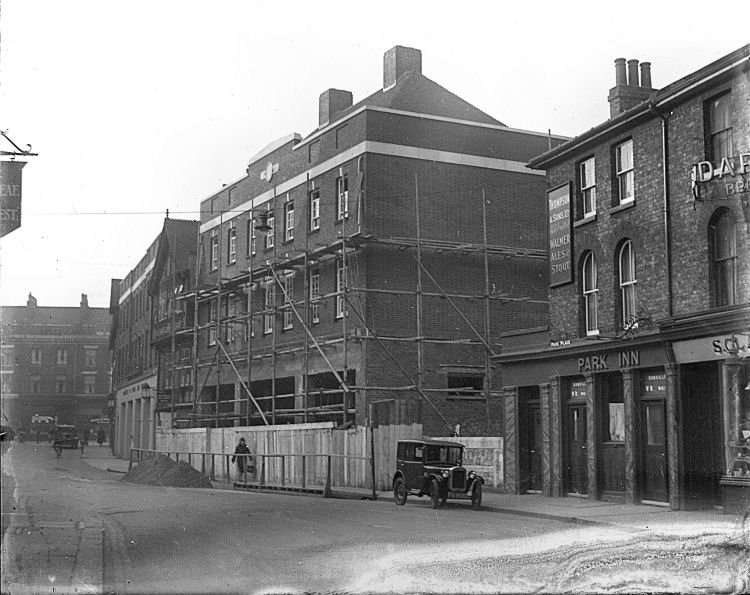
Above photo shows the "Park Inn" when it was just occupying one house.
Date pre 1938. Next to the pub was Clark's a bakery. |
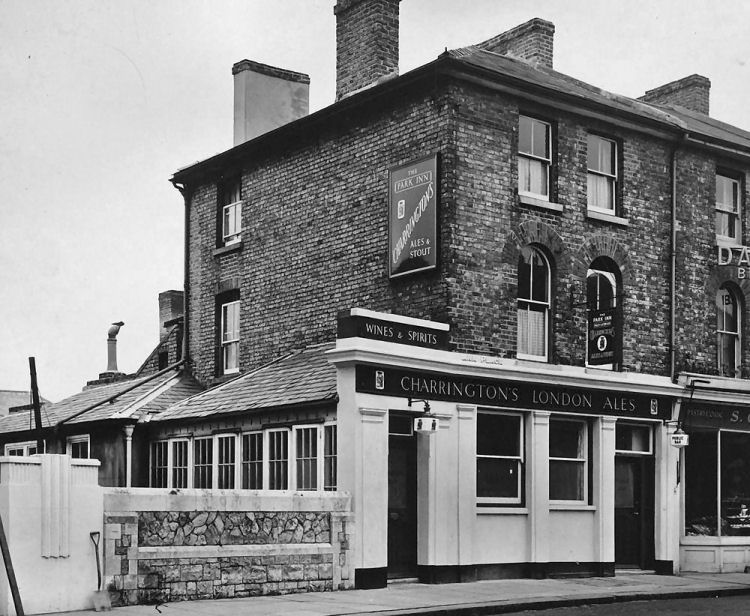
Above photo 1952.
Creative Commons Licence. |
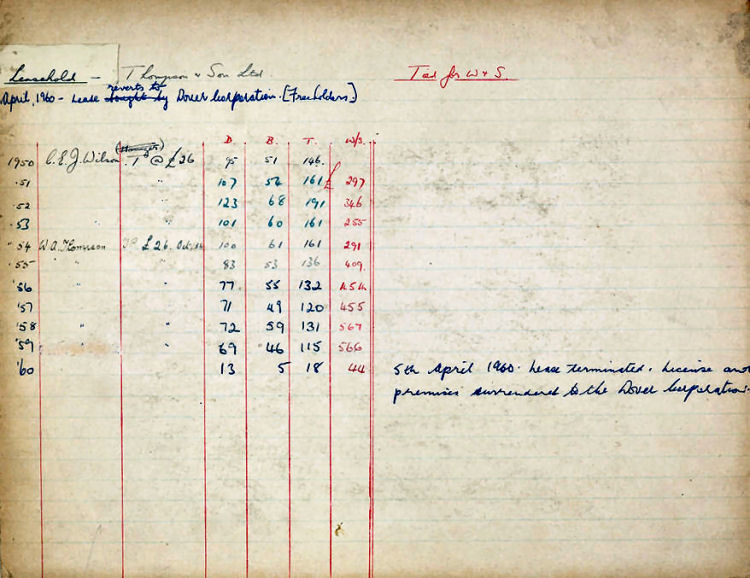
Thompson & Son ledger.
Creative Commons Licence. |
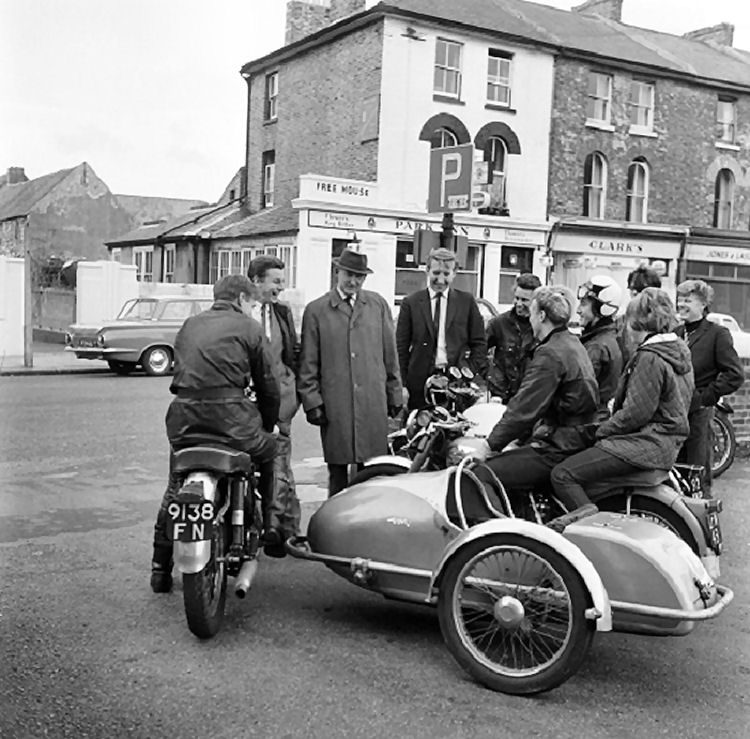
Above photo circa 1964, kindly sent by Rory Kehoe. |
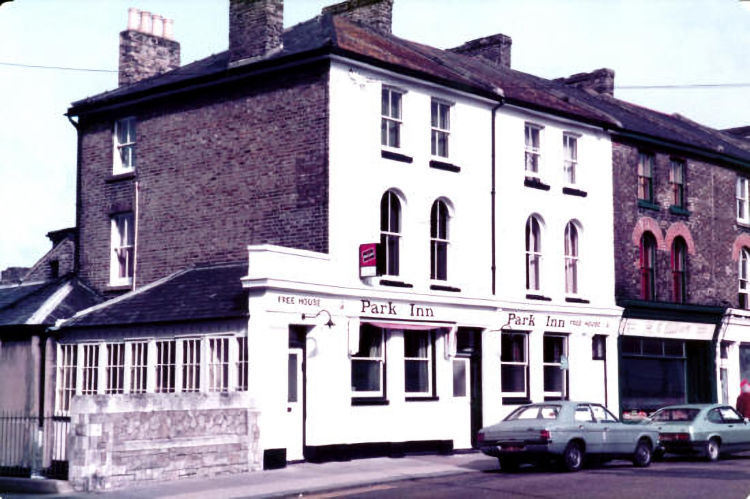
Above photo, 1983. Photo by Eddie Chard. |
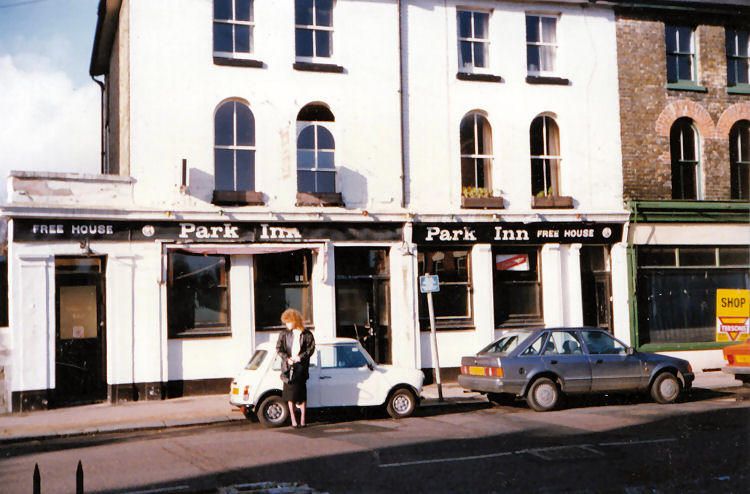
Above photo, 1990s, kindly sent by Michael Lock. |
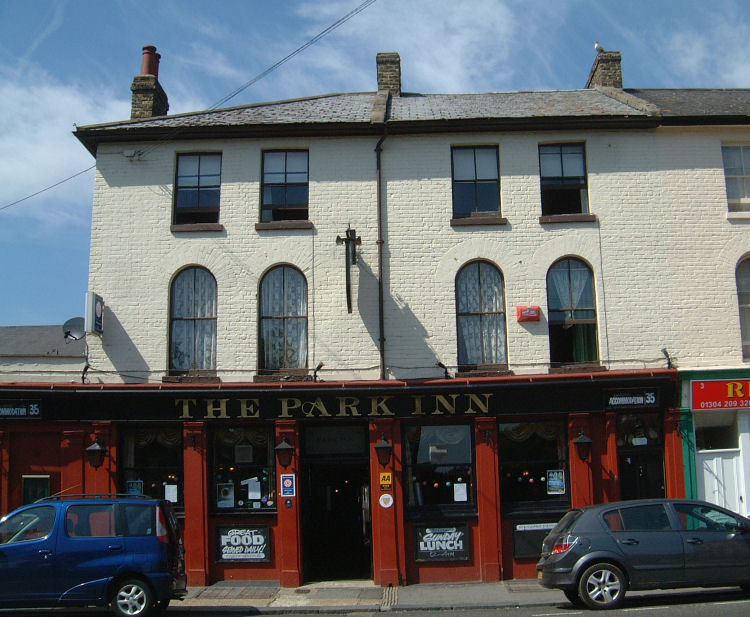
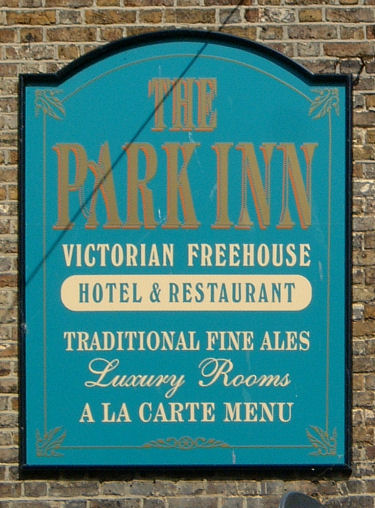 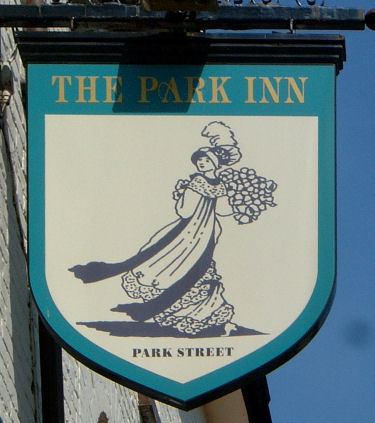
Above photos by Paul Skelton, 19 August 2009. |
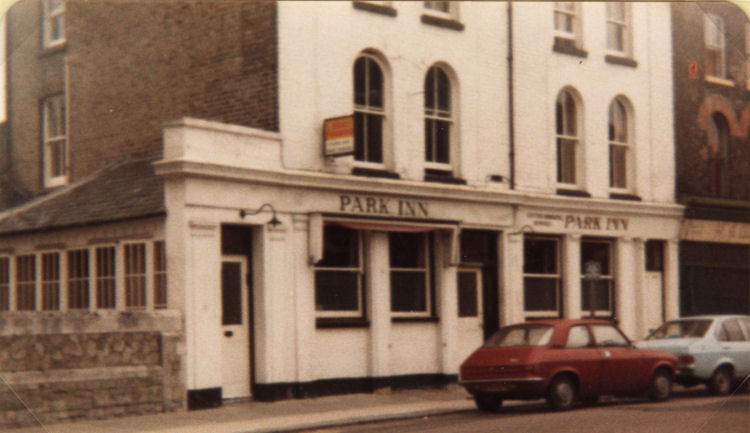 |
|
Above picture circa 1980 by Barry Smith. |
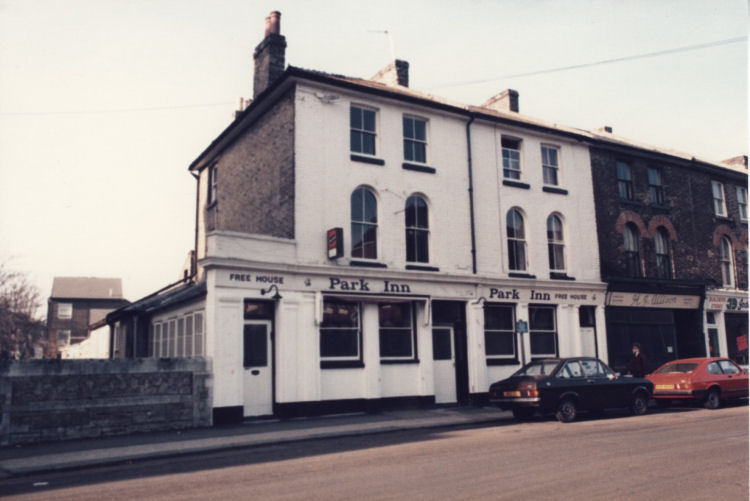
Park Inn circa 1987 (Photo by Paul Skelton) |
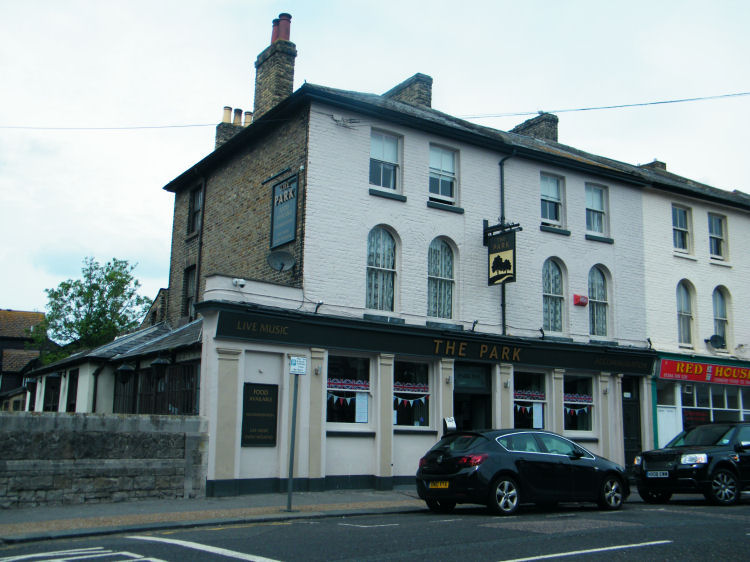
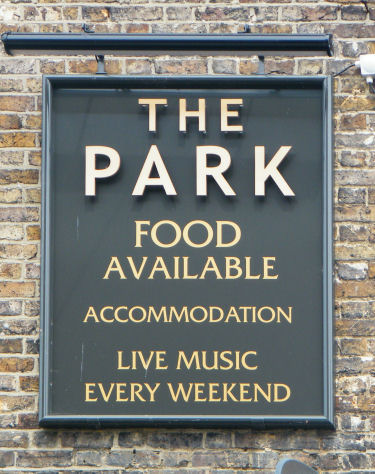 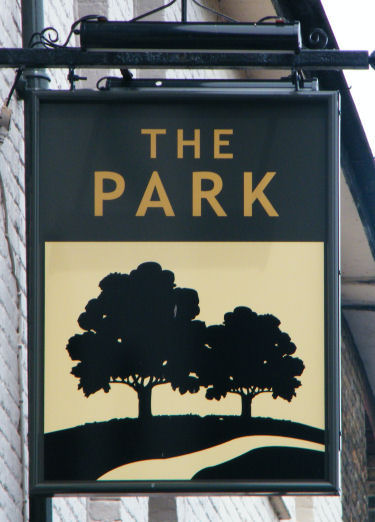
Above photos by Paul Skelton, 31 May, 2012. |
These properties were built in 1863 and this first opened as a pub the
following year. Although I believe there must have been a house here before
this was built, as the name turns up from a 1851 list of public houses held
at the Dover museum. Early opening was allowed from 1880 and continued after
1900. Meanwhile the premises were rebuilt in 1896.
In 1869-70 the pub was part of a consortium who were advertising their
goods of selling tea in response to grocers' selling beer and wine. (Click
for further details.)
The brewer closed for the duration of hostilities on 11 October 1940 but
the "Golden Cross" having become a casualty, Hayward moved here to reopen.
A free house to-day but an outlet of Thompson's Walmer Brewery for many
years.
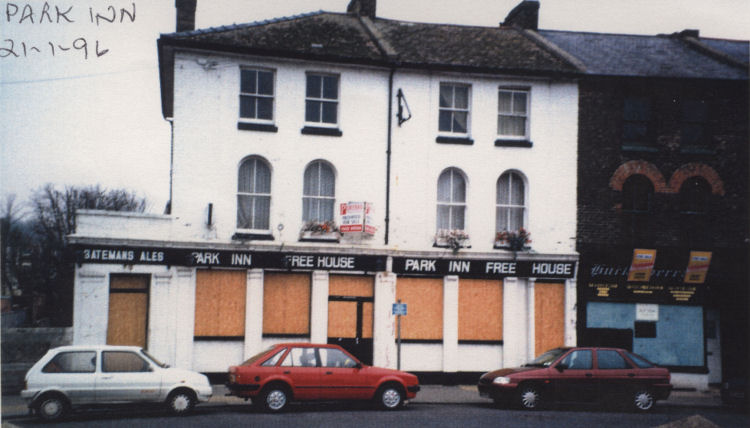
Above the Park Inn dated 21 January 1996 when closed for business.
|
|
From the Kentish Chronicle, 4 February, 1860.
POLICE COURT MONDAY.
(Before Charles Chaplain, Esq., Mayor. J. Iggulden, Esq. and R. M.
Reynolds. Esq.)
William Betts Wellard was brought up in custody, charged with assaulting
and threatening to shoot Thomas Hutchins, landlord of the "Park Tavern,"
in Park-street, on Saturday evening last, the 28th of January.
Wellard
pleaded drunkenness, and said that he did not recollect what he did; but
added, he regretted what he had done, and begged lenient treatment.
Six
mouths’ imprisonment in Sandwich gaol, or be bound over to keep the
peace for that period, himself in the sum of £20, and two sureties of
£10 each. Bail was procured and Wellard liberated.
|
|
From the Dover Express and East Kent Intelligencer,
30 August, 1867.
AFTER THE RACES
William Norman was summoned for assaulting Frederick Adams. The
assault rose out of some circumstances which transpired at the "Park
Inn" on the evening after the Races, and which was fully detailed by the
witnesses.
Mr. Minter appeared for the complainant and Mr. Lewis for the
defendant.
Frederick Adams said he was at the "Park Inn" between nine and ten
o'clock, or it might have been later, on the evening of the 22nd August.
He was in front of the bar, having been engaged in some raffling, when
he was seized by the defendant by the back of the neck and thrust
against the wall and afterwards into the street. Defendant then thrust
him against the shutters of the house and gave him two or three violent
blows. The defendant had not before spoken to him, nor had he spoken to
defendant; but during the time he was raffling, he said to the man he
was raffling with, "Be careful what you say here, as it may be mentioned
again." Mr. Brockman, the landlord of the house, thereupon made use of
some very abusive language; and the defendant, who is his
brother-in-law, came forward and thrust him (complainant) out of the
house.
By Mr. Lewis: When I said that what was stated might be repeated
again, the landlord did not say, "I know what you allude; you made use
of some very improper remarks the other day, and I told your brother." I
did not challenge the landlord to fight, except "conditionally," and
after his wife had interfered. I had a stick near me, but I did not
shake it at the landlord. The landlord did not say that unless I left
the house he should send for a policeman. He did not say "I am not a
fighting man," but it seems he keeps one on the premises. (A laugh.)
Mrs. Brockman did not say, "If you strike my husband, it shall be
through me." What she did say was, "I'll come round to you," and I told
her she had better send her husband. I did not threaten to knock in Mrs.
B's "daylights." The defendant did not say, on my making use of any such
expressions, "Remember she is my sister."
By Mr. Minter: The landlord called me a liar, and I told him that if
he was anywhere but in his own house I would give him a good pummelling.
William Adams, brother of the complainant, said he was at the "Park
Inn" on the evening in question. He heard the landlord call his brother
a liar, and shortly afterwards he saw the defendant take hold of his
brother and thrust him out of the house and afterwards assault him.
Norman did not desist from striking the complainant till witness's
sister, who was coming along at the time, got between them.
Br Mr. Lewis: I did not see my brother shake a stick at Mr. Brockman,
nor did I see him pull his coat off. before Norman put my brother out I
did not hear him say "Remember Mrs. Brockman is my sister."
Mr. Lewis, for the defendant said the complainant was very violent
and abusive in the house, and the defendant acting on the landlord's
behalf, put him out with no more violence than was absolutely necessary.
This, he admitted, the defendant was perfectly justified in doing. He
then called the following witnesses:-
Mr. T. S. Brockman: I keep the "Park Inn," in Ladywell. On Thursday
evening several persons were in front of my bar, including Adams. Some
conversation took place, when Adams said "You had better be careful of
what you say, as it will go further," making some allegation to me. I
told him he was not justified in making such am assertion when he spoke
in a very improper language, and wanted me to come out and fight. I told
him I was incapable of fighting as I was suffering from asthma. He then
became still more violent and abusive, and I told him he really must
leave the house. During the altercation my wife said that complainant
should not molest me, and Adams then shoved her, whereupon Mr. Norman,
my wife's brother, told him he must remember she was his sister. I
afterwards attempted to send for a policeman to remove complainant from
the house, and I then asked Norman to put him out, which he did, using
no more force than was absolutely necessary. The defendant went out
"????." (A laugh.)
By Mr. Minter: I believe I addressed the defendant in the mans gentle
terms I have been favouring the Bench with to-day. (Laughter.) But I did
call him a "liar"; and I made use of an adjective; but the adjective was
????? - nothing stronger, nothing commencing with a "h" I never made use
of such an expression in my life.
Mr. J. A. Lewis corroborated this evidence,
TO BE UPDATED as the original file was unreadable from here on.
|
|
From the Dover Express and East Kent News, Friday,
20 August, 1869.
MELANCHOLY SUICIDE AT DOVER
On Tuesday afternoon last an inquest was held at the "Park Inn" Park
Place, before the Deputy Coroner, Sydenham Payn Esq., and a numerous
Jury, on the body of Mrs. Martha Burton, a married woman living with her
husband in Dour Street, who had committed suicide by cutting her throat.
Mr. Thomas Clark was chosen the foreman of the Jury, and the
following evidence was taken:-
Charles Henry Burton, the husband of the deceased said: I am a
grocer's assistant residing in De Burgh Street. The deceased was my
wife, and her age was twenty-nine years. She has been in a low
desponding state of mind for the last three or four months, but she has
not been bodily ill. Deceased only returned on Wednesday night from a
visit to her friends, for change of air. During the last three months
she has been under the care of friends. She seemed more cheerful on
arriving home, and I thought she was better. I have not noticed any
great change since her arrival home. I quitted home about three minutes
to six this morning, leaving her in bed. She was then quite cheerful,
and bade me good bye. She wanted to get up, but I desired her to remain
in bed until seven o'clock. Some person came to the shop where I am
employed, about a quarter past seven and told me what had taken place. I
arriving home I found Mr. Walter and my lodgers with my wife. She was
then lying on the bed with her throat cut. Deceased was far too gone to
know that I was present. I have heard since her death that she had said
that if she did not die in three months she should make off with
herself, but she has never made any such remark to me. She was sinking
fast when I got home, and died about a quarter of an hour after my
arrival.
Henry Chalkly said: I am a galvanist living with my wife at the house
of the deceased. This morning about a quarter past six I heard a kind of
cough in the adjoining room, where the deceased and her husband slept. I
remarked the noise, and I shortly afterwards heard it repeated. I then
told my wife to open the door and look in. My wife being rather
frightened, I opened the door, and on looking in i saw the deceased
sitting in a chair with a looking glass before her, and blood running
from her throat, which was cut. I also saw deceased lay the razor, with
which I suppose she had committed the act, on the table. I told my wife
to go and fetch a doctor; but deceased implored me not to send, and
asked for a pen and ink to write. Deceased could not write; she was too
weak. I put my hand to her throat to stop the bleeding, and put a
bandage round her neck, and held it there for about five and twenty
minutes, while my wife was gone to fetch a doctor and to call some
neighbours. Deceased did not die before Mr. Walter came, and he remained
with her until she expired. She has generally been in a desponding
state. Her husband has always been affectionate towards her. She would
sometimes cry when spoken to.
By the Jury: the deceased and her husband have lived in the house for
two years, and I have lived there longer. When I heard the noise in
deceased's room I had no suspicion that she had committed suicide.
Mr. John Walter said: I am a surgeon living and practising in Dover.
A little before seven o'clock this morning I was called to see the
deceased, and went immediately. On reaching the house I found her
sitting in a chair in the bedroom, supported by Mr. Chalkly. her
dress was covered with blood, and on examination I found that it had
proceeded from her throat, which was cut. I examined the wound, and
found all the large vessels had been cut through. I had her laid on the
bed, and took what steps I could for her recovery, but found every
effort hopeless. Deceased sank very fast, and died in about half an hour
after I had arrived. I have no reason to doubt but that the act was
committed by herself. I had never attended her before.
It appeared that Dr. Baird, who was present, had previously attended
the deceased in the month of May of the present year, and it was
suggested that his evidence should be taken, but the majority of the
jury thought that this was not necessary.
The jury returned a verdict, "That the deceased committed suicide
while in a state of temporary insanity."
|
|
From the Dover Express and East Kent News, Friday,
3 September, 1875.
INQUEST AT DOVER
An inquest was held by the borough Coroner, W. H. Payn, Esq., at the
"Park Inn" on Tuesday, on the body of Emily Morris, who died from an
overdose of laudanum. (Tincture of Opium. Paul Skelton)
Jane Morris said: I am the wife of William Morris. The deceased was
my sister-in-law. She was a single woman, residing at 32, Dour Street.
Her health was very bad. She had been suffering for about 17 months with
dropsy. AT the onset she had Dr. Duke. Dr. Astley also attended her. One
of them called in about three months ago. I do not think either have
been in since. I have been in the habit of attending my sister-in-law
five or six times a day. Her own sister went for Mr. Fedarb, living at
10 Wood Street, as he had been recommended by a friend of hers. He
visited her every day. The deceased remained in the same unhealthy
condition till yesterday, when at about a quarter-past nine she sent my
little boy, 13 years old, to Mr. Adams, the chemist, in Park Street.
When he came back to my house, after having been to the deceased's
house, I asked him where he had been. He said he had been to Mr. Adams's
for four pennyworth of laudanum. I immediately ran across to the
deceased's house, and asked her what she had been taking. She said, "I
have taken nothing." I however searched the bed, and found the bottle
produced behind her back. She strongly denied she had taken it. I went
to Mr. Adams and asked him what he had sent. He told me, and then gave
me an emetic for the deceased to take, but she would not take it. Drs.
John and Clement Walter were sent for, and attended immediately, but she
still refused to take anything, and lingered until about a quarter-past
one this morning, when she died very quickly. She said she did not want
to live, her sufferings were too great. The bottle is marked "Leudanum,
Poison." It also says 30 drops are to be taken by adults in water.
Henry Morris said: I am 13 years old. I am the son of the last
witness. Yesterday morning I was sent for by the deceased to go and
fetch some laudanum from Mr. Adams's. I told him it was for my aunt. The
bottle was marked "Poison." I took it to my aunt, and she told me to go
downstairs and get out of doors as soon as I could. I went, and when I
got outside I met my aunt Maris. She asked me where I had been, and what
I had fetched. When I told her she ran upstairs to the deceased's room.
My mother also went.
Robert White Adams said: I am a chemist, carrying on business in Park
Street. yesterday morning about nine o'clock the last witness came to my
shop and purchased four pennyworth of laudanum' which he said was for
his aunt. I knew that his aunt had been suffering from dropsy, and gave
it to him. He asked me how much boiling water it required, and I told
him cold water should do, and he left my shop. About a quarter of an
hour afterwards Mrs. Morris came running to my shop, and told me that
her sister-in-law had taken the whole of the laudanum. I gave her an
emetic, and told her to give it to the deceased at once, and in the
meantime I went for Dr. Walter, and he and his son both attended at
once. Dr. Walter came to my shop and said the deceased refused to take
any medicine, and told me he did not perceive any appearance of her
having taken laudanum.
Josiah Fedarb and Dr. Walter said they tried to persuade deceased to
take some medicine, but she refused, and they left. There was no
appearance of her having taken laudanum, but she was looking very ill.
The Coroner summed up, and the jury returned a verdict "That the
deceased died from the effects of a dose of laudanum administered by
herself."
|
|
Kentish Gazette, 11 January, 1876.
DEATHS.
Adams:- January 7, at the "Park Inn, Dover, Martha, the beloved wife of
R. J. Adams, aged 51 years.
|
|
From the Dover Express and East Kent News, Friday 18 January, 1878
FIRE IN LADYWELL
On Saturday morning, about 2 o'clock, a fire broke out in the workshops
of Alderman Alcock, which are situated immediately at the rear of the
Town Hall. Owing to the flammable nature of the building material in the
interior the whole of the range of shops were soon in a raging body of
flame which appeared to threaten the ancient Maison Dieu Hall and
Council Chamber a few yards away, as well as a number of
dwelling-houses, stables, and stored adjacent. The Police were
immediately on the alert and the Fire Brigade, headed by Superintendent
Saunders, had brought up the fire engines and other apparatus and were
ready for work in an incredible short space of time. At about a quarter
to three o'clock the fire engine which was placed in the brook near the
“Park Inn” commenced to play upon the flames, and three other hoses from
hydrants. Even then the prospect of saving the workshops was hopeless,
for the interior of the buildings was full of new window and door frames
and other new work upon which 24 carpenters had been daily engaged
preparing for the numerous buildings of which Mr. Adcock had the
contracts, and these were all on fire.
The flames were threatening the dwelling-house, which was on the other
side of the workshop. Soon that would have been in the general blaze,
but the Superintendent directed three of the four of the hoses to be
turned upon it, the firemen getting upon the top of the roof of a shed
opposite effectively putting down the water. This at length effected its
object and the house was saved. On the other side, six cottages and
their inmates were in great danger. The heat blistered and scorched the
window-flames and eventually some of them caught fire, but the firemen
were equal to the emergency, with a hose worked from the brook at the
rear of Mr. Mummery's house, water was thrown on the houses and they
were kept safe. Meanwhile the large body of fire raged in the workshops,
and at length, towards half-past three, it had nearly burnt the whole
down, but it was threatening Mr. Pratt's ginger beer manufactory which
lay between the fire and the Town Hall. Here again the firemen directed
their attention and that successfully. Mr. Adcock's stables, full of
horses, were near the fire and with much trouble the horses were got
out, and much praise is due to Mr. Dodd, from the Working Man's
Institute, for the assistance he gave in putting the animals in a place
of safety at the “Royal Oak.” Mr. Pratt's and Mr. Mowll's horses were
also got out. A valuable dog who was in a building that was in flames
was got out alive to the animals great delight. Much praise is due to
the Police for their exertions as well as to the coastguardsmen and a
number of willing hands who assisted, and by their efforts the fire was
completely got under by five o'clock, although it has still to be
watched to prevent the breaking out of the smouldering embers. Mr. and
Mrs. Adcock were away on holiday, consequently two of their children
were sleeping in the house of Mrs. Osbourne, adjoining the workshops,
therefore, they had a narrow escape. The buildings are insured by the
Westminster Fire Offices, and the machinery and stock, which is also
destroyed are also insured, but it is feared that a great deal of the
new work on which the men were engaged is not – a portion of it,
including seats for a church, were got out. The men's tools are said to
be partly insured by the Carpenters' Society. The Mayor was on the spot
soon after the fire broke out and gave all possible assistance.
A subscription has been opened for 12 of the men whose tools have not
been insured.
|
|
From the Dover Express and East Kent News, Friday 12 August, 1881. 1d.
SAD SUICIDE
An inquest was held this morning at the “Park Inn” Ladywell Place,
before the Borough Coroner (W. H. Payn, Esq.,) on the body of John Penn,
baker, High Street.
Mary Brace said: I am the mother of the widow of John Penn, deceased,
who was a baker carrying on business in High Street, but resided at, 13,
Wood Street. I have been living at the house of the deceased for the
last two years. He was 45 years of age. His health was very bad and he
told me very often he was nervous and suffered with severe head aches.
The deceased was a sergeant-major of the Cinque Ports Artillery
Volunteers. I saw him last alive yesterday morning at half-past five,
when he was going round to the bake-house. He seemed low in spirits but
didn't say anything. The deceased leaves a wife but no children.
Thomas Appleton, assistant, proved finding his master handing in the
outhouse from a beam, and running to Mr. Browning's for help to cut him
down.
Mr. Arthur Long, surgeon, who was called in said he found the deceased
had been dead about an hour.
The Jury returned a verdict that the deceased committed suicide while in
a state of temporary insanity.
|
|
From the Dover Express and East Kent News, Friday 2 March, 1883.
The “Park Inn,” at Dover, very narrowly escaped destruction on Sunday
week. A fortunate discovery was made that the joints under the dining
room hearth were alight. It is an old tale, though the “Park Inn” is a
very modern erection. The builders had simply cemented the sides of the
hearth stones, so that on a large fire being kept up the material became
over heated and set fire to the wood below. It is rightly remarked in
the report that numerous fires occurring in this way are put down as
“origin unknown.”
|
|
From the Dover Express and East Kent News, Friday, 19 March, 1915. Price 1d.
PARK INN AND ITS GUESTS
At the Dover Police Court on Friday morning, before Alderman Bradley and
Dr. C. Wood.
Albert Charles Lewis, landlord of the “Park Inn,” Park Place, was
summoned for (1) unlawfully opening his premises for the sale of
intoxicating liquors at a time when his premises should not have been
opened, (2) selling intoxicating liquor at a time when such licensed
premises should have been closed, under the Licensing Consolidation Act,
1910, contrary to the statute.
Mr. Vosper, Assistant Town Clerk, prosecuted and Mr. Rutley Mowll
defended.
Mr. Rutley Mowll and defendant pleaded not guilty.
Inspector Hambrook said that on Sunday, 28th February, he was passing
the “Park Inn” at about ten minutes to twelve midnight. He saw the
landlord about to open the private bar door. He then saw a man named
Hall passing the house. Subsequently he put P.C. Petley in front of the
house and fetched Sergeant Riley and P.C. Merricks, and put them at the
back of the house. Witness knocked at the front door for 20 minutes,
getting no reply, although defendant saw him through the window. Witness
went to the back door and again knocked. He immediately heard a
scuffling inside. The door opened a little and the landlord said,
“Whatever's the matter.” Witness said “Why did you not come to the front
door?” Defendant made no reply. Witness said, You had customers in.”
Defendant said, “One or two friends.” P.S. Riley went inside the house
and in a room behind the bar he saw a man by the name of Wilking,
belonging to H.M.S. “Mowhawk,” and a woman by the name of Mrs. Hall.
Wilking said he lost his ship and was left behind. There was also a man
named Adams in the room. In the room also was a tray with seven or eight
glasses, which looked as if they had been recently used. Just then P.S.
Riley brought another man, Cyril Osborne, into the room. He had been
found in the scullery crouching between the safe and the wall. Witness
then asked the defendant if there were any other people in the house. He
made no reply. Accompanied by P.S. Riley witness went upstairs into a
bedroom and there found three soldiers in a single bed with their
trousers and shoes on. Witness took their names, but two of them proved
to be false. All the people on the premises with the exception of the
women appeared to be under the influence of drink.
Cross-examined by Mr. Rutley Mowll, witness said he was not aware if the
doors of the premises were locked. He did not try the doors.
Police Sergeant Riley, said when he went along to the back of the house
he heard someone push the bolt along and bolt the door. That was just
after 12 o'clock (midnight). Whilst he was waiting at the back door the
husband of Mrs. Hall came round. Witness waited twenty minutes when
Inspector Hambrook came round and knocked at the door several times and
eventually the landlord opened it saying, “What's up here?” Witness
heard scuffling sounds as if somebody was going up stairs. Up to the
time witness got there the door must have been unbolted. Witness
accompanied the Inspector into the house and on going into the kitchen
found a man named Osbourne crouching between the safe and the wall.
Asked what he was doing there he made no reply. Witness took him into
another room where the inspector and the landlord were, and the landlord
said, “I did not know he was there.” Behind the bar witness saw Mrs.
Hall and Mr. Wilking and Mr. Adams, and on a tray on the table were some
seven or eight glasses, which appeared to have been recently used.
Witness then accompanied the Inspector upstairs where they saw three
soldiers in a bed with their trousers and shoes on. Inspector Hambrook
told them it was not usual to go to bed with trousers and shoes on. One
replied: “We have got to be up very early in the morning; five o'clock!”
They then got up out of bed, put the remainder of their clothes on and
came down stairs, shortly afterwards leaving the house. They had been
drinking.
Mr. Mowll contended that the evidence did not show that the house was
open, but that it was closed, as the Police were outside and and could
not get in, and he quoted cases decided in the High Court to support his
contention.
The Chairman, after conferring with his brother Magistrates, announced
that the Bench considered that there was not sufficient evidence to
prove the first charge against the defendant. The charge would be
dismissed.
Mr. Vosper, in dealing with the second charge, said that with regard to
this summons it was not necessary for him to call witnesses again. It
was unnecessary for him to prove that an actual sale did take place.
Mr. Rutley Mowll intimated that it was upon the prosecution to
substantiate the charge in this case and so Mr. Vosper recalled
Inspector Hambrook.
Mr. Mowll contended that there was no evidence of actual sale or of
consumption being about to take place, as the Section referred to.
The Magistrates decided that there was such evidence, and Mr. Mowll then
outlined the defence.
Albert Charles Lewis, the defendant, said that on Sunday, the 28th
February, he had a Mr. and Mrs. Hall with him. They were friends, and
often came to his house. They lived in a terrace off Peter Street. They
were in the house that evening. Mr. Hall left at nine o'clock. Mrs. Hall
had her little son with her. She always brought him. Sergeant Pitman
was also with her. Sergeant Pitman remained at the house with Mrs.
Hall, at witness's invitation. Mr. Hall went home to get the soldier's
(who was billeted on them) supper. Sergeant Pitman was also billeted
with Mrs. Hall. Witness asked Mrs. Hall and Sergeant Pitman to stay to
supper. The man Wilking came to the house at nine o'clock, saying he had
missed his boat. Witness knew him before, and took him in as a lodger.
Witness knew Osbourne as an accompanist, and witness asked him to stop
back and “run” over some patriotic songs for him, as he was going to a
concert at Walmer. Osbourne played the piano and witness the concertina.
Witness had often had rehearsals with Osbourne. Adams worked for witness
every night, also Saturday afternoons, and Sunday all day. He did not
sleep on the premises except on a few occasions when witness wanted him
early on Sunday mornings. Adams' work was to take and bring things from
the cellar, sweep the bars, etc. He stopped to supper, and generally
left about eleven o'clock or half-past. On this occasion, after he had
been practising some of these things with Osbourne, they sat down to
supper. The potman had a pint of beer; the pianist and himself ale; and
Sergeant Pitman whisky. Witness heard a knock at the door, and went and
saw the two soldiers at the door. They told him that they had lost the
train to Folkestone, where they were stationed. Sergeant Pitam assured
him he was not contravening the law by putting them up, seeing they were
Sergeants, or Sergeant-majors, and finding the last train had gone, he
took them in, telling them, however, they “would have to lay pretty
thick,” (laughter). These men joined them in their supper, but took
nothing to drink.
Mr. Mowll: I think that accounts for all the people questioned. Did you
in any way know the police were there, and try to keep them out of the
house?
No, sir. I heard a knocking and went to the door, but there was no one
there, although I saw someone going up the road.
Mr. Mowll: Did you see the Police and try to keep them out of the house?
No, sir.
Mr. Mowll: Did you sell any of these people any drink?
No; not at all.
By Mr. Vosper: It was about eleven o'clock when he heard the knock at
the door.
Mr. Vosper: You have not explained why you were in such an inhospitable
host as to let your lodgers go to bed with their trousers and boots on?
I never go upstairs to see them into bed. Why, sometimes I have gone to
call sailors up in the morning and have found them with even their hats
on (laughter). They would tell you they were “full-rigged for the
morning” (laughter).
Further answering Mr. Vosper, witness said the sailor, Wilking ordered a
drink at about five minutes to nine. Mr. Hall went home to see the
soldiers billeted at his house.
Mr. Vosper asked why there was such a hurried move on the part of all
the people?
Defendant said that he could not be responsible for other people's
actions.
Mr. Mowll, calling Mrs. Hall, said this evidence brought was to show
whether there was a sale.
Mrs. Emma Hall, of Paul's Place, said she and her husband were great
friends of Mr. and Mrs. Lewis. They called on Mr. and Mrs. Lewis on this
afternoon, and she helped Mrs. Lewis, who had been unwell. She also
arranged to come back that evening, which she did with her husband,
bringing them with Sergeant Pitman, who was billeted at her house. She
sat in the sitting-room listening to the music during the evening. She
was having her supper when Mr. Lewis brought in the two Sergeants. These
soldiers had nothing to drink. There was no sale of drink at all. It was
nothing unusual for her to have supper at the “Park Inn.”
By Mr. Vosper: There was no money passed for drinks. The only drinks
they had were those Mr. Lewis gave them.
Sergeant J. Pitman, 10th Batallion Royal Sussex Regiment, billeted with
Mr. and Mrs. Hall, said he went round with Mr. and Mrs. Hall, and was
asked to stop to supper, and did so.
Mr. Mowll: Why did you go to bed with your boots on?
Well, I am supposed to be I my billet at nine o'clock and so from a
military point of view, I thought it inadvisable to be seen there.
John Arthur Adams, 35, Granville Street, said that for the last six
months he had been helping Mr. Lewis in the evenings and at other
certain times, and he confirmed the defendant's evidence.
Private Cyril Osborne also gave confirming evidence of the defendant's
statements.
Mr. Mowll: You showed more discretion than valour did you not, when the
Police came? (laughter).
I did not want to be seen in the house, thinking it might get me into
trouble in my civilian employment.
Mr. Mowll said that the Magistrates had positive evidence to negative
any presumption they might have found.
The Magistrates said that they were satisfied that the evidence given
was sufficient. They had decided to convict, and would proceed with the
third case against the defendant (for permitting drunkenness on the
premises).
Mr. Mowll asked if he might suggest that the prosecution should not
persist in the last summons as the Bench had decided to convict?
The Magistrates having ascertained that the evidence would be the same,
allowed the case to be withdrawn, and imposed on the defendant Lewis a
fine of £5, including costs.
Arising out of the above case, the four witnesses for the defence were
then summoned for being on licensed premises during closing hours, the
Police having been unable to serve the summonses issued against the
others also found in the house.
Formal evidence then was given by the Inspector Hambrook, and the
Magistrates said that they considered that Mrs. Hall and Adams were
possibly there as legitimate guests and employed on the premises, and
they cautioned Osbourne and Pilman, but did not register a conviction.
|
|
From the Dover Express and East Kent Intelligencer, 22 February, 1929. Price 1½d.
POLICE RAID PARK INN
LICENSEE CONVICTED BUT TO APPEAL
At the Dover Police Court on Friday, before Messrs. W. B. Breett, T.
Francis and G. Golding.
Emily Pennington, licensee of the “Park Inn,” Park Street, was summoned
for suffering gaming to take place on the premises on January 11th.
Leslie Pennington, her son, was summoned for aiding and abetting.
Mr. R. Mowll appeared for the defendants and pleaded not guilty.
Mr. O'Meara, who prosecuted, said that observation had been kept on the
house for some time and on January 11th it was decided to visit the
premises.
Inspector Leeming said: At 10.35 p.m. on January 11th with P.S. Pay I
went to the back door of the “Park Inn,” having previously posted P.C.'s
Moore and McLeod on the front doors. I tried the back door and found it
locked. I then knocked. Footsteps came, and a voice said, “Who's there?”
I replied, “Police.” The voice said, “All right,” and immediately the
footsteps retreated into an inner room. I heard a commotion. The
footsteps came again immediately and the door was then opened by Leslie
Pennington, who said, “What is the matter?” I replied, “I am going to
visit your house.” I then entered with the Sergeant into a room situated
at the back of the bar marked “Private” and which is used as a smoking
room. On entering two men made a rush for the door heading to the
passage to the front door. Seated at a small green baize covered card
table behind the door we had just entered were four men. Before each man
was a number of playing cards face upwards. By the side of one man's
cards were a number of copper coins which he snatched up and put in his
pocket before he could be prevented. By the side of another man's cards
was 6d. in coppers which he snatched up and tried to put under the
table. I saw P.S. Pay seize his wrist and ask him to hand the money
over, which he did. I then cautioned Leslie Pennington and told him I
intended to report him for allowing gaming. He replied, “I am not the
licensee, my mother is, and she is upstairs.” I asked that she be called
and he went upstairs and came down, followed soon after by Mrs.
Pennington whom I cautioned. I told her what I had found and would
report her. She replied, “I have not been well, I have been upstairs all
day with a bad throat. I did not know what was going on down here.” I
replied, “You as licensee are responsible for the conduct of your
house.” I visited an upper room with Leslie Pennington and advised him
to get rid of his customers. He replied, “It was entirely my fault. I
asked them to stop and play a game. The room was lighted fully but there
was a dark blind you could not see through.”
The Magistrates' Clerk: How many customers were there?
Four at the card table, two round, and there were a number of people in
the front room, probably a dozen.
Cross-examined: He knew whist. That was not played with the cards up.
Mr. Mowll: Not when the Police come even?
Inspector Leeming said that whist was not played with 44 cards but 52.
He only found 44.
The Magistrates' Clerk: The others were not up your sleeve?
I got all there were on the table.
Further examined: A penny was dropped on the floor. From the room
overlooking Ladywell there was a sound of music.
It was quite evident Mrs. Pennington had a musical party?
Yes.
No charge arises on their part?
No.
Re-examined. One of the men who rushed for the door he found upstairs
with that party.
P.S. Pay corroborated. He said that one of the men who rushed for the
door he found upstairs and the other at the rear of the premises in the
lavatory. When he seized one man's hand with the coins in it he made no
explanation but some considerable time afterwards, when the landlady
came down he said it was change from his beer. Leslie Pennington said,
“No, it is not, you have had no beer since 10 o'clock.”
Mr. Mowll: No charge arises out of supplying intoxicating liquor?
Three glasses had apparently been recently emptied of beer.
P.C. McLeod said that at 10 p.m. he kept observation to see how many
left at the expiration of permitted hours. Sixteen people left between
ten and ten minutes past. He kept observation until 10.15 and no one
else left. At 10.30 he took up a position at the front of the “Park
Inn.” There were no lights in the bar at the front, but there was in the
room upstairs and a piano was playing. He had been there almost two
minutes when the music stopped suddenly. At 10.35 p.m. he heard a noise
inside the door when he was standing as of footsteps approaching and he
heard the handle of the door turned and the door was opened about 2ft.
Witness caught hold of the handle outside and saw the defendant Leslie
Pennington. Behind him was another person but he could not identify him.
The door was immediately pushed to from the inside. There was a rush of
hurrying foot steps. Witness opened the door at once and saw Leslie
Pennington disappear through some curtains. At 10.40 Pennington came to
the door and witness stood there until 11.15 when he was joined by the
Inspector and the Sergeant.
This closed the prosecution.
Mr. Mowll called Henry Freeman Caspell who said that he was in the “Park
Inn” from about ten minutes to nine. It was club night, which closed at
nine. About that time Leslie Pennington said that his mother had a
musical party upstairs and he would like one or two to stop and play
when the house was closed. He was one of those invited. Some of them had
an ordinary game of whist as usual before 10 o'clock. About 7 or 8
minutes to 10 Leslie Pennington said, “If any of you gentlemen want any
more drink will you get it at once.” There were a number of orders as
was usual, but witness did not order one. He noticed that the defendant
in giving one gentleman his change, placed it on the under side of the
right hand corner of the card table. The five invited to play were Mr.
Gladish (the grocer), Mr. Hately, Mr. Ready and Mr. Barton, beside
himself, making six with Mr. Pennington. Those playing did not include
Mr. Pennington or Mr. Barton, but they would have taken the place of
players numbers 1 and 3 or 2 and 4. The game they were playing was whist
and they were playing for social purposes until there was no money or
money's worth in any shape of form in it. When the Police arrived there
was the bang on the back door. Defendant was then in the centre of the
room watching the game with a view to putting the pegs in the cribbage
board, which was on another table. Defendant went at once to the door.
Within half a minute the defendant was back in the room and followed by
the Inspector and Sergeant. One of them, looking at the card table, then
said, “This is unlawful gaming.” The table simultaneously was tipped to
witness's left into the lap of Mr. Ready. One of the Police said, “I
have got the money which is 5d.” He was then told by Mr. Gladish, “That
is 6d; my change from a 1s. for a pint of ale ordered some few minutes
before ten.” In his own hand he had the cards (just as now produced) the
other being face up for scrutiny as to who was the winner of the rubber.
There was one and a part pack of cards on the table, one being faulty
and used as a trump indicator. He knew of no game with 44 cards. There
was no money snatched up or was there any other money there. He did
remember Sergt. Pay saying that he saw Hately put some in his pocket and
Hately said you are assuming that. Witness never saw him do that.
Cross-examined: He referred to the “Park Inn” Social Club, (a share-out
club) and produced his card. He joined it for social purposes and that
was as far as he was concerned. The officials attending to receive
subscriptions on Fridays. Defendant occasionally invited him to play
after hours. They usually broke up about 11 o'clock. Defendant had often
said he did not care for musical parties. There was only Mr. Barton in
the room beside them playing when the Police arrived. There were two
packs of cards, no matter what the Inspector said. They were playing
with one pack (the yellow pack) and the other (the green pack) they cut
from. If the Inspector said there were 44 in the pack seized, he could
not help it, it was not true.
Witness held up the two packs and said that it was easy to see which had
only 44 in.
Mr. O'Meara: You are an expert card player?
Mr. Mowll: he means an expert carpenter. (Laughter.)
Questioned further in regard to the pack, witness said, “You are going
to bluff me. I know what I am talking about and I am telling you the
truth.”
Cross-examined: If the inspector said that there were two piles of money
on the table, it was untrue.
Mr. O'Meara: Again a plausible excuse.
Mr. Mowll said that he strongly resented the way his witness was being
treated by Mr. O'Meara making such remarks.
In reply to another question as to the packs of cards, witness said,
“It's time and it's common sense.”
Mr. O'Meara: It's time, Mr. Caspell. As to common sense, I will not say.
Mr. Caspell was questioned as to the statement that he had made that it
was coincidence that the cards were still the same in the pack then
produced, and Mr. Capsell held up the green pack.
You counted that pack just now and there were 44 cards, therefore you
were playing with that pack?
We were not playing with that pack.
Mr. O'Meara: That will do.
In reply to Mr. Mowll, witness said that he was holding that pack at the
moment as a trump indicator.
Robert Gladish, grocer, of Tower Hamlets, said that he ordered the pint
of bitter and gave a shilling for it. The change was put on the shelf
under the card table by Leslie Pennington. That was the only money there
was when the Police arrived. They were playing a hand. The other pack
(green back) they were using for cutting for trumps.
Cross-examined: it would be difficult to see the money on the shelf as
one walked into the room. The first thing the Police did was to take the
cards over his back. He could not tell them how far they were in the
game.
You were not likely to be holding the cards from the indicator pack.
Oh, no!
Mr. Caspell has told me he was holding the trump indicator cards!
I know nothing about that. I know mine were all right. He could not have
held them to play with.
Mr. Mowll: You are a well known trades man and you have only come here
to tell the truth?
That's all.
David Hately, antique dealer, Castle Street, said they were playing at
Whist. He was a little deaf and did not realise the Police were there
until they were in the room. He had no money on the table and he did not
know there was any under it until it was knocked over. His cigarette box
was knocked over and the Police looked into it, but fortunately, there
was no money in it.
Cross-examined: they were playing at the time. He did not snatch any
money up. It was up to the Inspector, not the Sergeant, to accuse him.
Reginald George Ready, 36, Waterloo Crescent, employed by his father,
outfitter, said that they were playing Whist and they were not playing
for money or money's worth. It was a friendly game.
There was no cross-examination of this witness, and Mr. Mowll said that
it seemed strange that it should be so when the whole of the case was
the question of money. The case was at its best only a case of suspicion
and it was remarkable that Mr. Gladish, if he had been playing for
stakes should have known how much money there was and said that there
was another penny. Mt. Caspell had been subject to the absolutely
ferocious cross-examination, but he ventured to say that he had come
through it unscathed. His stake in the case, was not very large. It
should not be a very great disgrace to be convicted of being there for
unlawful gaming. Did they think Mr. Caspell would come here and perjure
himself in order to escape a trivial liability!
The Chairman said the Bench had given the case every consideration and
weighed the evidence for both sides, and they had come to the decision
that the case had been proved. They had decided to fine Mrs. Pennington,
being the licensee, £3, as she was answerable for her servants doings.
The summons against Leslie Pennington would be dismissed.
Mr. Mowll said that he would ask that the other summonses against those
playing should stand over for the time being because there would be an
appeal against the conviction of Mrs. Pennington. Otherwise it would
mean paying the expenses of five appeals.
The Chairman said that they would grant that and allow the cases to
stand over until May 10th. They fixed the amount of the recognisance of
Mrs. Pennington at £25.
|
|
From the Dover Express and East Kent Intelligencer, 2 August, 1929. Price 1½d.
THE PARK INN RAID
At the Dover Police Court this morning before Messrs. W. D. Brett, G.
Golding, and S. Livings.
Robert Gladish, Henry Freeman Caspell, Reginald George Ready, and David
Frederick Hately, were summoned for gaming at the Park Inn on January
10th.
Mr. R. Mowll defended, and said that he was willing to adopt the
evidence already given.
The Magistrates' Clerk said that otherwise the Bench would have ordered
witnesses out of Court.
Mr. Mowll said he was not going to flog a dead horse, and he was not so
foolish as to ask the Bench to stultify their own decision. The Recorder
had passed remarks and there was no moral imputation against the
defendants, and as far as their fitness for ordinary society was
concerned he was sure no one would attach any imputation, and these
comments were the sentiments of everybody. The bench knew the defendants
to be respectable members of society in the town and he left the case in
their hands.
The Chairman said the Bench would treat them very leniently and they
would be fined 10s. each.
The Magistrates' Clerk: Inspector Leeming suggests that coppers found in
the case should be put into the Poor Box.
Mr. Mowll: I should have thought you would have taken that on account.
(Laughter.)
Inspector Leeming: What about the cards?
The Magistrates' Clerk: No offer. (Laughter.)
|
|
From the Dover Express and East Kent News, Friday 29
July, 1938
PARK INN LANDLORDS FATAL FALL
The Dover Borough Coroner, Mr. E. T. Lambert, held an inquest at the
Town Hall, on Tuesday afternoon, on the body of John Frederick Bent
Strange, aged 45 years, the licensee of the "Park Inn," Park Street, who
died a few minutes after falling in the cellar of his house.
The Coroner sat with a jury, as follows:- Messrs. T. Parks (foreman),
G. Porter, W. H. Hudsmith, W. S. Lelliott, M. S. Lear, A, Campbell and
A. Harvey.
Mrs. Muriel Elizabeth Strange, widow of the deceased, gave evidence
of identification. She said that deceased had not been well for the past
week, but was up and seemed all right to Saturday night. He had suffered
from gout off and on, but they did not think it was necessary to have a
doctor to attend to him because he knew what to do during these spells
of gout. When he came down on Sunday morning he said that he was quite
fit for work, and wanted to get on with the cleaning of the cellar. He
went down into the cellar at about eleven o'clock, while witness was
polishing the canvas in the bar. The cellar, which was lighted by
electric light, was not very high, and one had to stoop when in it. It
was right by the side of the river, and the floor, which was of
concrete, was always wet and slippery. At about a quarter past eleven
witness called down to deceased, asking him to turn on the beer-tap,
which he did. A few minutes later she heard him call her name and she
answered. He did not reply, and she called, "Why don't you answer Me?"
She went down to see what had happened, heard him giving awful gasps,
and found him lying against one of the barrels. He was unconscious and
bleeding very badly at the head. Witness could not tell what had
happened. There were no signs of his slipping because the floor was so
wet. He was alone in the cellar all the time.
Miss Lilian Langley, who is employed at the "Park Inn," said that she
was in the kitchen at about 11.20 on Sunday morning. She had seen
deceased earlier that morning, and he appeared quite happy, as usual,
and did not complain of feeling ill. She heard Mrs. Strange shout out to
her to fetch a doctor, and she went for one, but he was not in, and,
returning, she found the ambulance outside the house.
Mr. Edward Prescott, of the Eight Bells Lodging House, New Street,
said that he was in the "Park Inn" on Sunday morning. He was talking to
Mrs. Strange when she went down into the cellar. He was deaf and did not
hear deceased shout. The previous witness came to him and said that Mrs.
Strange needed help, so he went down into the cellar and helped her to
carry the deceased upstairs. They then summoned the ambulance from the
Fire Station. As far as he knew, there was no one else in the house at
the time.
Dr. S. Marinker, House Surgeon at the Royal Victoria Hospital, said
that deceased was admitted to the hospital at 1135 a.m. on Sunday. He
was bleeding at the head, and there were no signs of life. Witness made
a post mortem examination the same evening, and found a haemorrhage on
the brain, which was due to a severe contusion of the brain. Here was no
fracture of the skull, but it seemed evident that the haemorrhage on to
the brain had been caused by a violent impact on the skull. This could
have been caused by a fall. Deceased seemed quite healthy, and there was
no evidence of disease of his internal organs. Death was due to cerebral
haemorrhage.
The jury returned a verdict of death by misadventure, and expressed
their sympathy.
|
|
Dover Express 31st July, 1943.
THREE SAILORS & A CLOCK.
At the Dover Police Court on Friday last, before Messrs. C. W. Chitty, H.
E. Russell and F. A. Holmes and Miss Elnor.
Three sailors, Francis Herbert Smith (37), Ernest Philip Curtis (30) and
Harold Joseph Harper (29) were charged with stealing a clock, valued
30s, the property of Mr. G. Tester, from 8 Priory Road.
Defendants pleaded guilty.
Inspector McLeod said that, at 12.5 a.m. on 17th July, War Reserve
Pascall saw defendants walking towards him from the direction of Priory
Road and Curtis was carrying a clock under his arm. When questioned
Curtis said “I won it in a raffle at the “Park Inn." When told that they
would be taken to the Police Station, Curtis said “Oh, no, you won’t. We
have got to go on board” He placed the clock in a doorway and they ran
away. The Constable caught Smith and the pendulum of the clock was found
in his pocket. Curtis was caught later and he said “We heard the clock
ticking and my mate picked it up and put it under my arm”. Inspector
McLeod added that the premises were furnished but unoccupied and had
been damaged by enemy action.
Smith said that they were very sorry. They had had a good evening and
they were drunk, otherwise they would not have done it. They had no
intention of stealing.
An officer said that Curtis and Harper had very good characters and
Smith a good one.
The Chairman said that, in view of defendants’ good characters, they
would be dealt with leniently.
Fined 5s each.
War Reserve Pascall was commended by the Bench on his smart work.
|
|
Dover Express 19th May 1944.
DOVER LICENSEE & NAVY TOBACCO.
At the Dover Police Court on Friday before Messrs.G.Golding, W.G.Jeffrey
and Mrs. Binge.
Enoch Haywood “Park” Inn, Park Place, was summoned for harbouring 1/2lb
uncustomed Navy Cut Service tobacco with intent to defraud H.M. of the
duty thereon. Defendant was also summoned for aiding and abetting the selling of
tobacco by an unlicensed person. Mr. Rutley Mowll appeared for defendant, who pleaded guilty to the first
summons and not guilty to the second. Mr. W. Hall Hisken, prosecuting for the Commissioners of Customs, said
that he would offer no evidence on the second summons. On 10th February
H.M. Customs visited the “Park” Inn and, in the course of a search, they
found a half pound tin of Naval tobacco. It might appear that the case
was much ado about nothing, but there was something very different
between Naval tobacco and ordinary tobacco. Navy tobacco was supplied
exclusively to H.M. ships for use on board and anyone in a seaport town
should have known that fact. Although the quantity was small, the
gravity of the case was the larger because Haywood was a licensee and a
licensed dealer in tobacco and should have known that no duty had been
paid on the Navy tobacco. They regretted to have to bring such a case
because defendant’s books were in perfect order and there was nothing
against his character. When questioned, defendant said that he bought
the tobacco from a sailor and added “If my daughter had been quicker
removing it, as I told her, you would not have found it”. It was well
known in seaport towns that there was unlawful shipping of tobacco. Mr. Mowll said that defendant was out when a Marine entered the bar and
said to Mrs. Haywood “I have got 1/2lb of tobacco. Would you like to buy
it?” She gave him 5 shillings. The following morning, only a few minutes
before the customs men arrived, Mrs Haywood showed the tobacco to her
husband, who at once said, “You had no right to buy that”. Defendant had
been a licensee in Dover since 1938 and had conducted his houses
satisfactorily. He was bombed out of one house and his present premises
had been damaged several times. He had been a model of pluck in enduring
what he had in Dover and, among the heroes of Dover, and there were
many, he was entitled to an honoured place. The Chairman said that the evidence was serious for a man in defendant’s
position, but they had decided to take a lenient view on that occasion. Fined £5 and 2 guineas costs. Mr. Mowll said that the magistrates would appreciate that Mr. Haywood was
in a very important position holding a licence and the brewers desired
to know whether that conviction would affect the renewal of his licence. The Chairman said that they were not in a position to say what other
magistrates would think, but, as far as they were concerned, they saw no
reason why it should affect the renewal. |
|
Dover Express 23rd June 1944.
At the Dover Licensing Sessions on Friday last week, a music and singing
licence was granted to the “Park” Inn, Ladywell.
|
|
Dover Express 11th August 1944.
THEFT CHARGE DENIED. SAILOR’S LOST PAY BOOK.
Mrs. Florence Louisa Gwendoline Roberts was bound over for 12 months on a
charge of stealing £2 and a Naval identity book, the property of AB William
Alfred Wilkinson, by means of a trick on 7th June.
Defendant pleaded not guilty.
Wilkinson said that he was ashore and went to the “Park” Inn and saw
defendant at the bar and offered her a drink. He had about £3 in his pay
book and took money out of it to pay for the drinks. He later took her home
and showed her his photograph in his pay book and arranged to go in the
house. She told him to go to the back door and she would let him in. She
asked for his pay book to make sure he did not go away. Witness went to the
back door and knocked there for five minutes, but there was no reply. He
went round to the front door and found the place was empty. Witness reported
the matter to the police. The next day witness went with another sailor to
the Police Station and afterwards to defendant’s address and saw her. She
showed him into a room, ran off, and left him there. Another woman came in
from next door and they went to look for the pay book near the house where
he left the defendant the previous night. The other woman handed him the pay
book, which was intact except that the £2 was missing. Defendant said that
she would send on the money but he had not received it.
Violet Evelyn Richards of 27 Longfield Road said that, on June 8th, Mrs.
Roberts asked her to come round to her house and said that a sailor was
accusing her of taking his pay book and £2. Witness asked if she had it and
she said “No” and ran to the front room and locked herself in. Later she
said that she was with the sailor in Clarendon Street alley. Witness went
with Wilkinson to look for it. They were unable to find it. She went to a
house and was handed a book. She gave it to Wilkinson.
Mrs Winifred Ellen Stroud of 182 Clarendon Street, gave evidence that she
found the pay book in the alley at about 6.30 a.m. on June 8th whilst
returning from the caves. There was no money in it. She handed it to
Mrs. Richards later.
D.C. Vine said that, when questioned, she walked part of the way home with a
sailor, but did not steal his pay book or money. On 11th June, he again
questioned her and she said that Wilkinson was drunk and was waving his
papers about
may have dropped it. Nothing incriminating was found in defendant’s handbag.
P.C. Pollington said that Wilkinson, who had been drinking but was not drunk,
made the complaint to him at 10.55 p.m. on 7th June.
Defendant said that Wilkinson made a suggestion to her on the way home and,
to get rid of him, she told him that she lived in the house in Clarendon
alley. Wilkinson had been waving his pay book about all night and she did
not handle it. She told him that, if he had lost the money on her account,
she would send it to him.
Inspector Wilkinson said that the defendant’s husband was in the Royal Navy
and there were five children. She had no convictions.
|
|
From the Dover Express and East Kent News, 7 January, 1966.
After six
years as landlord of the Park Inn - Dover Corporation's only public
house - at Park Place, Mr. George Hawkins is leaving at the end of the
month. He and his wife Kay will continue to live in Dover.
A former member of the crew of Dover lifeboat, Mr. Hawkins has been
in the trade for 20 years. Before moving to the Park Inn he was for
three years licensee of the Green Man at St. Margaret's Bay.
|
|
From Dover Town Centre Magazine November 1997
NEW PUBS IN DOVER TOWN CENTRE
*** THE PARK INN ***
Another big town centre investment has been completed bringing back into
use a 130 year old pub. Gary and Beverley Virtue, a Dover couple who
have made such a success of The Crown at Finglesham near Deal, have
invested over £100,000 to return The Park Inn to its former popularity.
Gary, a former Archers Court School and Dover Grammar School boy, bought
the Park Street premises and has carried out considerable internal
alterations.
"The aim is to retain its essential Victorian-style but
also to create a popular eatery to attract a mixed-age group to
customers," says Gary. His Crown Inn at Finglesham, which he will
continue to run, has already won a number of awards, including one for
being judged the "Best Pub in the district for attracting tourists".
Gary and Beverly re-opened The Park Inn on 27 October. The premises,
alongside the river, were built in 1863 and opened as a pub a year
later.
|
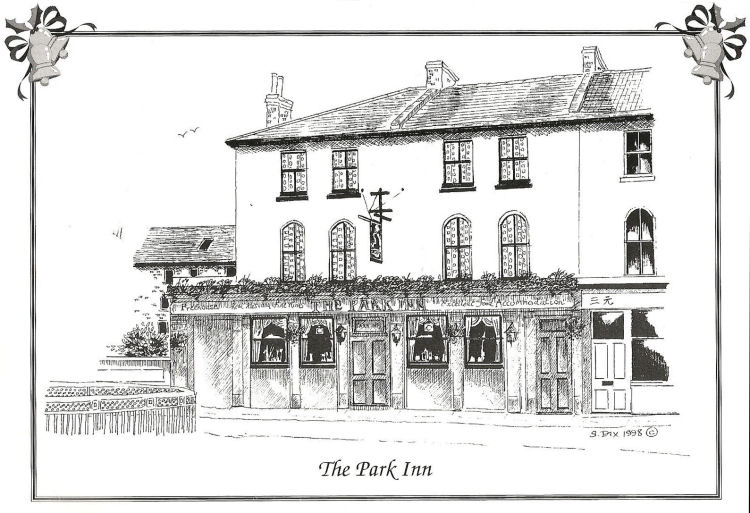
Above shows a
Christmas card sent in 1998. Kindly sent to me from Lorraine Sencicle. |
|
From the Dover Mercury 21 January 1999
Inn restored by one of the lads.
As A lad, in the days when he drank lager
and lime, Gary Virtue would make his way round Dover, with his mates,
calling in a for a drink here and there. He always cherished The Park
Inn, in Dover's Ladywell.
He said: "It had such a lovely atmosphere even if it was a bit
run-down." Now, he has cherished it to such an extent that he has bought
it and restored it to its earlier Victorian splendour and instead of
drinking lager and lime, he now has straight Carlsberg!
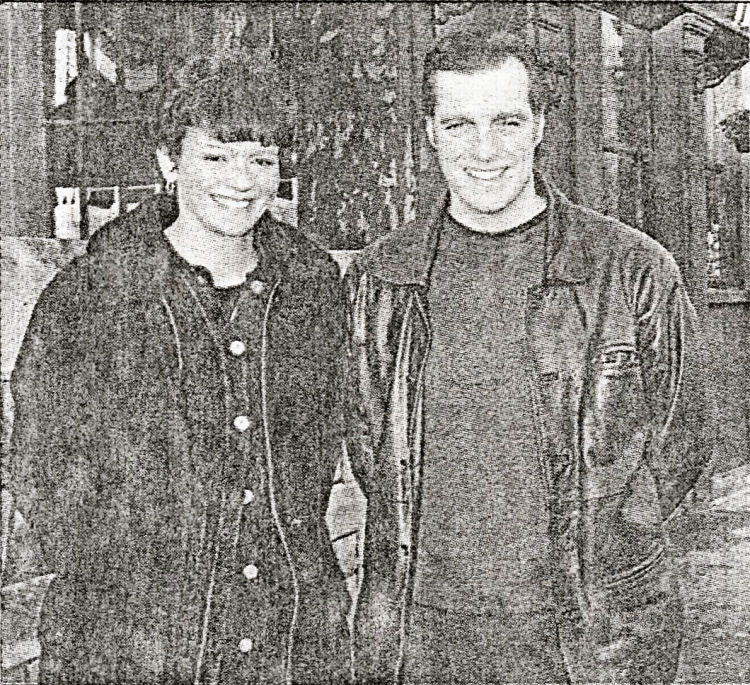
Gary, 40, was
born and brought up in Dover, going to Archers Court before transferring
to Dover Boys' Grammar School to do his O-levels.
With five to his name he headed for what at the time was one of
Dover's most successful businesses. He said: "I went straight into
shipping, freight forwarding for George Hammond. Those days it was a job
in a really growing business, the docks were thriving and there must
have been more than 200 shipping agents, ranging from one-man bands to
the big ones such as George Hammond."
Then, his father Henry took on The
Hare and Hounds at Northbourne and with that Gary and his wife joined,
along with his brother, Glen, in running the pub for the next two years.
That too flourished, to such an extent that Mr Virtue senior was made an
offer he couldn't refuse and Gary went back into shipping.
He said: "But
I had got the taste - literally - for being a landlord."
He took on The Crown at Finglesham with his wife
Beverley and and after a couple of years his thoughts began to focus on
The Park Inn.
He said: "It was built in 1861 and licensed in 1863. It was in a sorry
state, just about ready to fall down. I kept my eye on it, thinking it
was bound to come on the market and that, if it was the right price I
would buy it."
On January 27,1997, work started on The Park Inn and it opened its doors
10 months later.
Gary said: "I contacted The Victorian Society in London
it is very strict about what's allowed and what's not - got in
reproduction fireplaces and knocked down walls, put up walls and found,
through Yellow Pages, Peter Upton at Temple Ewell, a pub man
himself, who created the plaster covings.
"When the Royal Victoria
Hospital was turned into flats, they had to take out fixtures and
fittings and Peter was able to get the mould of the ceiling plaster
work, which is now on our ceiling. It's a nice touch."
No ghosts were
disturbed in the rebuilding and the only curios uncovered were shop
bills dating from the 1930s period.
Gary and Beverley have twins, Harry
and Rachael who will be three in March and Gary's other pub, The Crown,
has regularly garnered awards for the excellence of its food and beer.
He is bringing the same kind of dedication to The Park. He said: "It's a
pub where you can get good quality food."
|
|
From the Dover Express, 19 May 2003.
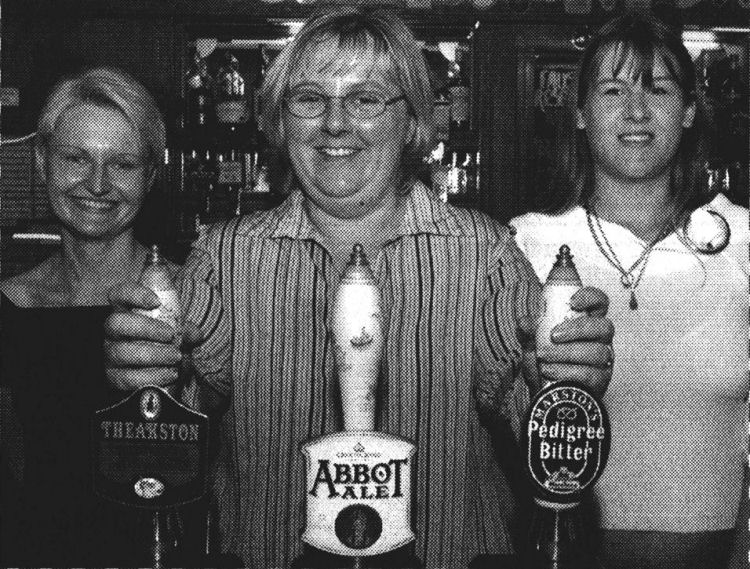
Above photos shows Ola, Tina (manager) and Gemma.
The Park Inn
has been serving the people of Dover since 1863 and with the
ever-changing face of European and world travel it is a popular stop-off
point for tourists and business travellers from around the world.
Whether they call in for a sandwich and a coffee, a bar snack, the
restaurant menu, just a drink or bed and breakfast, the attraction of
the English pub is just as great as it ever was. With the many offerings
of food, drink, entertainment and accommodation, the Park Inn is well
equipped to attract every type of customer.
A free house, the Park Inn
has been managed by Tina Holley for the past 13 months. Arriving from a
major chain outlet where she was a deputy manager, Tina is surprised at
how close and friendly a traditional pub can be. "There are no barriers
here between staff and customers. It is a very friendly and comfortable
atmosphere. The range of clientele is staggering. Young couples,
middle-aged, older couples, single clientele and families with young
children, and they all feel at home here," says Tina. One of Tina's
first challenges as manager was to stem the high turnover of staff. Tina
adds: "Customers like to
maintain relationships with my staff.
"Before I joined there had been
a high staff turnover, but we have settled down and on the rare occasion
a position becomes available we have a high demand from applicants.
"Staff training and
specialised courses have given us a strong staff base. This consistency
is good for us."
She is now aiming to work closely alongside new Head
Chef Jamie Colvin to promote the exciting menu on offer. Tina says:
"We have a busy food trade and we have hosted large parties for
weddings, birthdays and anniversaries.
"But I firmly believe a lot of
people in White Cliffs Country are still to discover us and what we have
to offer.
"For whatever reason when on a visit to Dover, we can cater
for all their needs if they wish to dine with us."
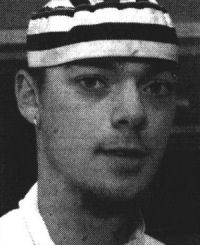
Jamie Colvln,
20, and an employee at the Park Inn for nearly 4
years, has been awarded the coveted position of Head Chef. Jamie
explains: "l joined the team here as a kitchen porter and immediately
felt part of the family. A professional kitchen set-up and a good
working atmosphere made me realise that I wanted to progress here and
enhance my catering knowledge." Following the past two years working
under the guiding hand of the experienced Darren Knight, Jamie and the
Park Inn management team feel he is ready for the challenge.
Jamie
adds: "l have the support of two good chefs which will
allow me to
concentrate on looking for new directions to take our menu. I aim to add some modern
cuisine to our more traditional dishes. A
very 'something for everyone' menu is something I look forward to
achieving here." The Dover born chef believes he can achieve award-winning
recognition for the Park Inn. Jamie states: "My belief in
using fresh local produce blended with a twist of imagination and
listening to the views and opinions of my diners will encourage me to
produce the best traditional English cuisine outlet in the area." His
backup is provided by recently appointed Michael Riley and Steven
Holley.
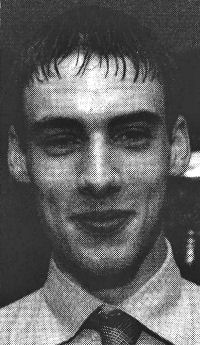
Tina Holley, Manager at the Park Inn, has announced the latest employee to be
offered a training course. Paul Andrews is to attend a Bar Managers
Workshop at the courage Brewery in Reading, Berkshire. The three-day
course includes all aspects of work in the pub industry including
customer service, good service, beer quality, health and safety and the
BII National Licensees Certificate. Following two other staff members'
successful attendance on the course last year Tina states that is is
another indication that the Park Inn believes in employing, quality
staff and is prepared to back this belief with certificates. Tina says:
"A certificate confirms your professionalism and puts the whole aspect
of the pub industry in perspective. We strongly believe that in-house
training sets the standards of an employee but achieving awards allows
the person to measure his progress as seen by a third party.
New Head
Chef Jamie Colvin has just completed NVQ Level 2 in Catering and is
awaiting commencement of Level 3. Paul Andrews is looking forward to the
challenge. He says: "When I was offered the position here I was promised
backing to be allowed to advance my career. I thoroughly enjoy the
pub/restaurant business and hope to make a successful career from it.
This is a great way to start."
Tina Holley adds that his can only be of
advantage for the Park Inn. "Staff training here has proved
successful in the past and will do so again in the future," she says.
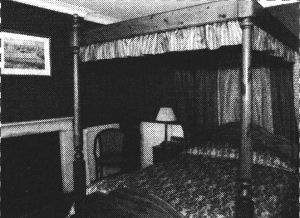
With the completion of five en suite rooms in
September 1999 the Park Inn offers everything a visitor to Dover may
wish for. Manager Tina Holley is 'amazed by her guests' enthusiasm. Tina
says: "Many visitors, particularly American guests, love the feel and
atmosphere of an English Inn, and the business traveller relishes the
warm and relaxing atmosphere of the cosy rooms." With an English Tourist
Council Four Diamond Silver Award and AA Four Diamond Award, the Park
Inn boasts one of the best ratings in White Cliffs Country. Tina adds:
"The success of our rooms is measured by repeat business. If guests have
stayed with us before, they always wish to return to us on their next
visit to Dover.
"The en suite rooms are decorated in period Victorian
colours and have retained features from when the building was first
constructed in 1861. Tina says: "A popular feature is the original
marble fireplace in our four-poster room. Guests love the sense of
history that emanates from such a feature." An ideal location for all
local attractions and amenities, the future appears bright for Tina's
five rooms. She says: "We offer tea and coffee making facilities,
trouser press, alarm clock/radio and a popular attraction is the
satellite TV channels. After a good night's sleep I like to serve my
guests a hearty English breakfast which sets them on their way for the
rest of the day whether business or pleasure."
ELVIS, BUDDY, ELTON and FREDDIE ...
Just the one name is enough to set against a famous face from the
history of rock 'n' roll. The one thing they all have in common is that
they have all performed at the Park Inn.
Yes, the look-a-like tribute
acts commenced here in 1998 and have become must-see shows in Dover.
Park Inn employee Ola Swan-McVie has seen several shows during her two
years' employment. She says: "The atmosphere on the night is electric
and the standard of the performance is extremely high. Gary Mullen as
Freddie Mercury in 2001 was incredible. He had just won a television
show and his show was amazing. It was as near to watching the real
thing as ever could be." Her fellow employee Gemma Stannard mentions
the counterfeit Beatles Duo and the recent Billy Fury Tribute as nights
that customers still talk about. Gemma says: "A drink or three, a lovely
meal and superb entertainment is a unique night out in the Dover area
and I feel our customers appreciate these special evenings." Tonight,
Thursday 19 June 2003, the tradition is continued with a performance by the
Beached Boys and on Saturday 21 June the Park Inn Talent Contest is
staged for the fourth year running.
SIX REAL ALES
Paul Andrews joined the Park Inn during March of this year to tend the
bar and manage the busy cellar. His biggest task is ensuring the quality
of the six real ales on offer. Paul explains: "Actually the job of
keeping these 6 ales is made all the more easier by the high turnover of
them all. The headaches would come if any of them were sitting around
but they all sell so well."
Old house favourites such as Marston's
Pedigree and Old Speckled Hen along with the very popular Courage Best
are backed by a Theakstons Pump and two guest ales. "A great boost in my
position is a customer commenting on a 'cracking good pint!'" says
Paul. "It makes all the effort worthwhile." all the' effort worthwhile."
|
|
Saturday 18th September 2004 Ghost Search
The Park Inn once housed a brothel and the Madam still walks the
corridors today and likes her presence to be felt. In the flat above,
which we have access to, is home to a male energy, that likes to
terrorise anyone he can, you have been warned!!!
The Investigation Report
The footage captured at The Park Inn is fantastic, we caught not only
Orbs, but Orbs that seem to explode just like fire works, as well as
sweeping mist formations. The Park Inn is a highly active place and the
data collected proves it, to us at least.
Many guests reported feeling very light headed and of having the
sensation of 'some-one' blowing in their ear or on their face. A number
of guests said they were touched when there was no one near them. When
doing séances a large percentage felt tingling sensations, of being
pulled and pushed. One guest got a push so hard she fell to the floor,
but just like a true ghost hunter she got back up and carried on.
Room 2 was an eventful place, this is where I dropped my guard and a
Spirit entity entered me. This is the first time this has happened to me
personally and I found it a surreal experience. I knew what was
happening, yet had no control over my body, mind and voice box!! Peter
and Tom did rescue work on me there and then, I remember looking up (as
I had slumped to the floor) and seeing lots of faces starring down at me
with wide eyes and mouths agape. I wanted to jump up and say 'I didn't
fake this honest', I felt like a right banana.
On floor two a couple of guests reported seeing someone moving down a
corridor, there was no living person in that area at that time!
Although this venue is active, most of the evidence that Spirit were
(and still are) present seemed to be in a non visual form, except to the
night cam recordings, physical sensation was the other form of contact.
I would have liked audible evidence, as I know the energy at The Park
Inn could have produced that. But, if ghost hunting and gathering
evidence was that easy there wouldn't be the need for people like us.
Saturday 2nd April 2005 Ghost Search
This was conducted at
the pub after a previous meeting. The following is an article as posted
on the Ghost Search Uk website on 13 July 2005.
When we visited The Park Inn back in September 2004, many of the
residential Spirits were over shadowed by the low entity's that ran amok
throughout the building. Since we carried out cleansing work after this
investigation, I am pleased to say that both owner and staff have not
reported any more nasty disturbances. Yet both my team and I wanted to
go back in to get to know and try to capture evidence of the more benign
energies that are still present to this day. There is still 'the man'
that is often seen in the public bar area, alongside a number of young
children. On the upper level a 'madam' still walks the corridors and has
been seen by many people, presumably looking out for the girls that used
to be under her care when this building was once home to a brothel. The
cellar still retains the male energy who likes nothing better that to
drop beer glasses; he does this for effect rather than to scare. Bob and
Caroline, owners of The Park Inn, are once again allowing us to not only
investigate the bar and restaurant area's, but are also permitting us to
use all rooms on the upper floors. This large property that has been
lent to us for the night, holds much promise for people to experience
paranormal activity and to get to know 'those' that walk while guests
sleep soundly.
The Investigation Report
A huge thank you to Caroline, owner of The Park Inn, your hard work and
team spirit didn't go amiss: You're a star.
Not only was this investigation relaxing and very enjoyable, each group
came away with some paranormal experiences.
My group and I went to room two and had about an hour and a half of 'unexplainables'.
As usual, the door to the room we entered was closed, this keeps outside
noises out, and alerts other groups that the room is occupied. We all
noticed the heaviness of the room upon entry and after a few minutes of
chatter we formed a circle and commenced with a séance to help charge
the atmosphere up a little more. I soon felt a female energy enter the
room and it became apparent we had met when I last held an investigation
at The Park Inn. The energy this lady carried was strong and I asked her
to show the guests the strength she possessed by pulling, pushing or
touching them individually. Standing to my right were two male guests,
Mark and Stephen, both of whom were the first to be chosen. Their joined
hands very gently began to be raised in front of them, each asking the
other 'were they doing that'? Both denied they were moving their hands
voluntary and we continued to watch as their hands were lifted up and
above their heads, gently their arms were pulled back and they were left
in mid air for about a minute or so. Astonished at what was taking place
they commented the blood was running out of their arms, slowly the limbs
were lowered to there normal positions. I asked if she would mind
showing someone else in the circle her strength, I saw her move
anti-clockwise and it was soon evident who the next chosen one's were.
Kevin (guest) was heard saying, "Is that you?". "No" Caroline laughed
nervously. "Look my hand is on top of yours, how can I pull your hand
up?". Sure enough both hands were once again being lifted. Both arms
were at there full extent before they began to lower. Kevin later told
both Myself and the rest of the group that as his hand was being lifted
he pulled with all his might to lower his arm, thinking if Caroline was
responsible he would achieve his goal. Needless to say, he found it an
impossible task. Another two circle members had their arms lifted whilst
one of them (Dave Medium, we worked together that night) was also being
pulled forward and bent over at the same time. Now unless Dave is a
contortionist, I doubt very much if he could have achieved this position
and keep his weight in mid air at the same time!!
After the circle broke up I asked if Spirit could give us another sign
that they were with us, we all soon clearly heard at various times,
noises. They stemmed from creaks that came from the door area, to loud
thuds in corners of the room. Each time a noise was made we would survey
the area, but could find nothing moving (as if someone had knocked them)
and nothing was out of place. The door area seemed to be the focus of
Spirit's attention. Guests felt 'someone' there when there wasn't,
movement and sounds emanated for no reason. It was towards the end of
our vigil in room two, that I (Having been on the opposite side of the
room all night) noticed that the door had been opened. It was ajar as
opposed to being opened fully. At no time had a human been near the
door, to which this can be proved by taped evidence. I asked Spirit if
they were responsible and if so could they open the door further. Within
seconds we all witnessed the door opening, it only opened a small
amount, but never-the-less, with no breeze what so ever we could not
find another explanation as to why a solid wood door could open on it's
own. There was no-one on the other side when I checked. I had a go at
camera work for a short time and remembering to press the record button
(it has been known at past investigations I have neglected to....but
then I never said I was technical minded!) I managed to capture two orbs
on request, I had asked Spirit to show themselves in a light form and
make their way across the room to me. I also caught an orb dancing in
front of Steve, plus an additional two orbs. So, not only am I really
pleased with myself but can honestly say "What a fantastic night.
Donna. (Ghost Search Uk Paranormal investigator).
http://www.ghostsearchuk.co.uk/
|
|
Advert below appeared in the Dover Express 4 January 2007.
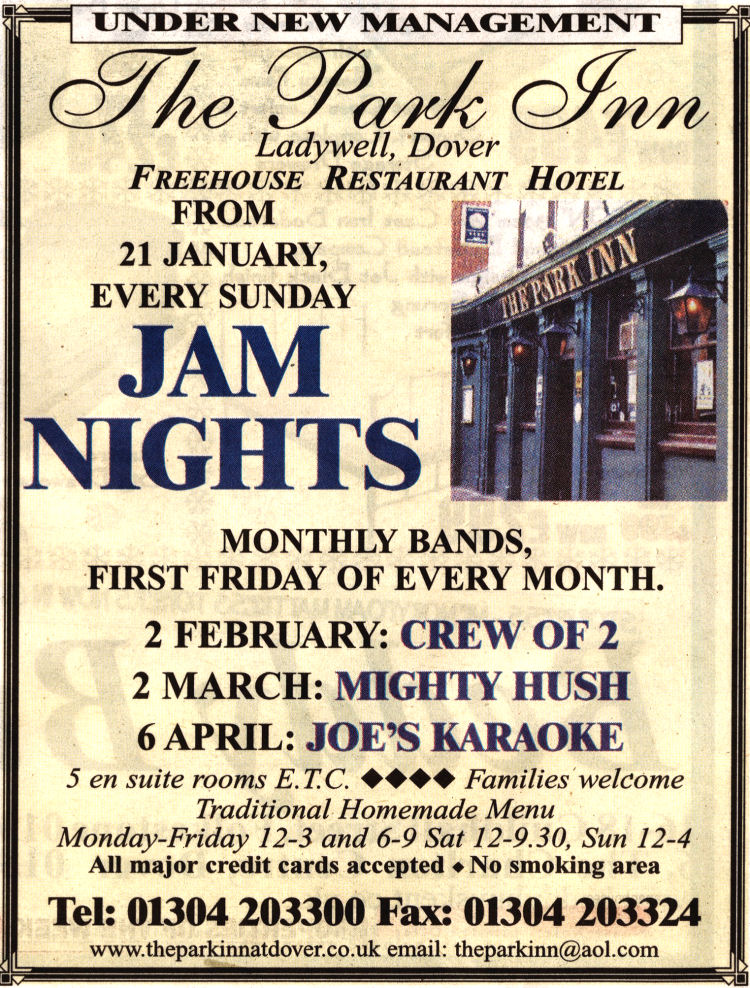 |
|
From the Dover Express, 6 February 2014. By Mike Sims.
Pub squeezed out by street’s new inn crowd.
Council ‘created too much.
A TOWN centre boozer shut last week blaming the council for creating too
much
competition.
The "Park Inn" closed its doors last Wednesday when a private party was
held, with
punters offered cut-price pints and spirits for £1 each earlier in the
week to clear stock.
Dented.
Landlady Mandy Richards, who had run the pub and rooms for more than five
years, told
the Express the opening of a micropub a few doors down in Park Place had
dented her
business.
She said: “Dover District Council shouldn’t have given it planning
permission, what were
they thinking of?
“It’s enough of a struggle anyway and there’s now three pubs, plus "Key
Stores," on a
street that is 50 per cent residential.”
The "Rack of Ale" micro-pub opened in Park Place in a former opticians
shop last year,
while thousands has been spent on the "Sir John Falstaff’s" renovation.
Mrs Richards said: “People haven’t got the money these days, we were
struggling for
customers and just couldn’t carry on.
Competition.
“I’ve given it my best shot and the rooms side of it had been picking up,
but last year was
very tough. It’s owned by Punch and I don’t know if they’ll be putting a holding
manager in.”
Several punters have claimed the "Park Inn" was one of the most expensive
places to sup
a pint in town.
Roaring.
One, Alex Wilshaw, said on the Express’s Facebook page: “They were never
going to do a
roaring trade when they were charging £4 for a pint of Stella.”
DDC cabinet member Nigel Collor defended the authority and argued it could
not stand in
the way of new businesses wanting to open.
He said: “Under licensing rules we can’t refuse it. It’s competition and
we have to have a
justifiable case to refuse it, we can’t just say no.”
|
Although Gary and Beverley were licensees from January 1997, the pub
remained closed whilst renovations took place and there was a grand
re-opening in October of that year.
The pub was sold to Punch Taverns in June 2004.
The CAMRA branch meeting of June 2008 reported that the pub had changed
hands.
|
From the Dover Mercury, 28 April, 2016. By Victoria Chessum.
Money raised from event to go to Fire Fighters Charity.
Festival is fitting tribute to music enthusiast Sean.
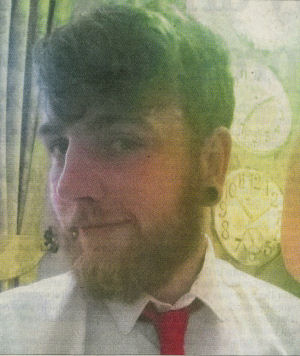
Sean, left, died in a car accident in December.
A night of music has been arranged as a tribute to a much loved
man who died when his car crashed into a tree and burst into
flames.
Sean Petch, also known as Shorn, died on Sunday December 6,
when he lost control of his blue Seat Ibiza in the Alkham Valley
Road, between Dover and Folkestone.
The former Dover Grammar School for Boys pupil had a big
group of friends in both towns.
Emergency services rushed to the scene, at 10.30pm near Kearsney Abbey, but he could not be saved.
The event - dubbed Petch Fest - has been organised by Sean’s
best pal, civil servant James Nesbitt, 23, of High Street in Dover.
It will raise money for the Firefighters Charity.
Sean was a fan of live music and also played the guitar, and the
evening will go ahead from 4pm on Sunday May 15, at the "Park
Inn," in Ladywell, Dover.
The commemoration will include food, a photo booth and a raffle.
Mr Nesbitt said: “Sean was well
loved within in the group, there is a lot of us.
“We all see each other like a family and he was the centre piece
in that.
“He brought all of us closer together.”
The Fire Fighters Charity was chosen as the beneficiary by
Sean’s family.
Mr Nesbitt said he was also organising the event “because there
is not enough music in Dover and there needs to be a platform
for younger musicians”.
Sean left his mother, Elaine Wilson, dad Graham Petch, sister,
Carla, and brother, Liam.
He lived in Folkestone, studied at Canterbury College, and
worked for Church & Dwight, a distribution company in Wear
Bay Road, Folkestone.
To find out further information about the event, visit
www.facebook.com/events/1721647134715199/
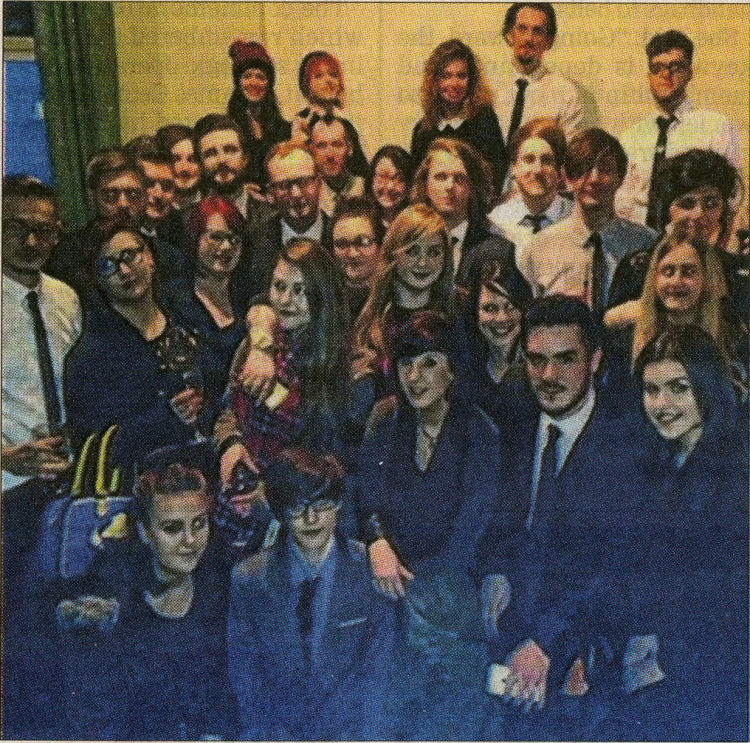
Friends of Sean Petch at his wake.
|
Closed 2016. Reopened as an Indian Restaurant in 2017 called "Virsa the
Heritage."
|
From the Dover Express, June 15, 2017.
By Adele Couchman.
Restaurant owner who likes ‘a challenge’ saw potential in disused inn building.
Revamped
pub set to offer true experience of India
few years.
A NEW Indian restaurant has taken the place of an old Dover pub.
Virsa opened its doors on Saturday, June 3, replacing The Park Inn pub
that suddenly closed last year.
The Indian restaurant and takeaway also has a hotel upstairs, and is set
to create a number of jobs for the area.
Transformation.
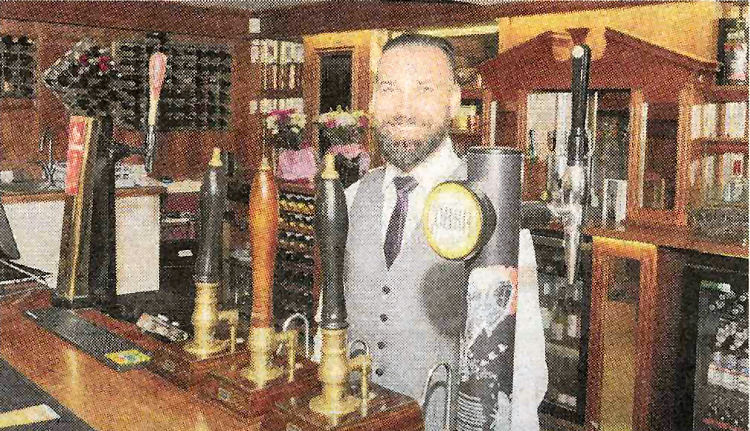
Owner Andy Nanda, 35, who lives in Folkestone, came to Dover to
transform the empty pub to provide a ‘traditional Indian’ experience. He said: “The Park Inn was shut for nearly nine months and had been
going downhill for the last few years.
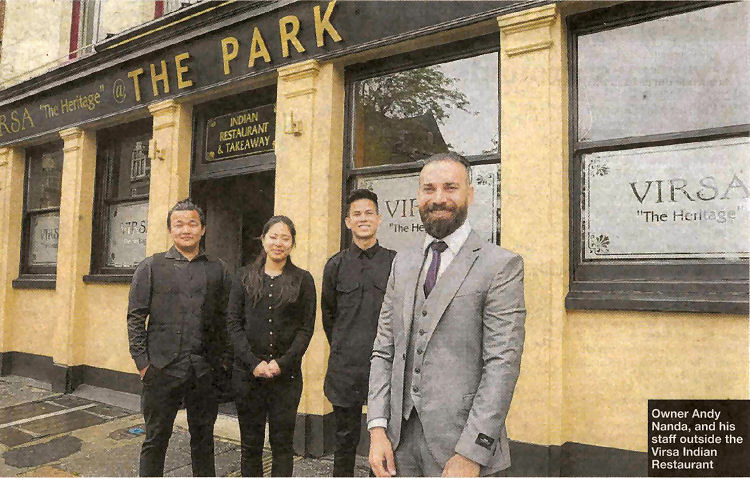
Andy and staff are promising a ‘traditional’ Indian experience.
“We took over from the beginning of March, and took it took us over
three months to get it up to standard.”
Mr Nanda has also taken over the running of a disused property in
Dartford and has transformed it into a hotel called The Fulwich.
He added: “I saw the potential and location in here in Dover, and I like
challenges.
“In Dover there is not many places to go for a decent meal, so this is
somewhere you can go on a Friday night with friends and family.
“Virsa means heritage, so we will provide traditional food and interior
decor.”
The restaurant is expected to create around 25 jobs for kitchen and
waiting staff.
|
|
From the Dover Express, 29 June 2017.
Exquisite Indian restaurant now open in Dover.
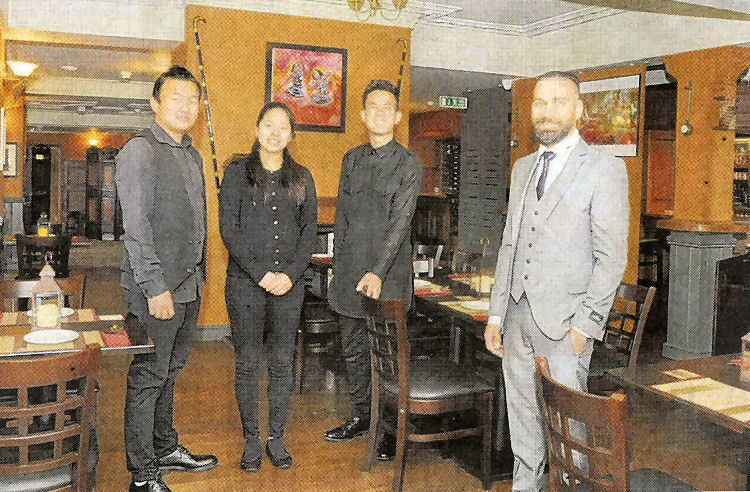
Virsa The Heritage opened their doors recently and have built up a loyal
following of diners in a short period of time.
The restaurant offers fantastic Indian food which is always freshly
prepared using the finest of ingredients. Owner Andy Nanda says: “For every one diner that has experienced our
Indian food and the way we run our business we have four diners
returning, I have been overwhelmed by the support from the local
people.” Owner Andy has taken time out to answer a few questions.
What made you decide to open a restaurant in Dover? Dover has got lots of potential with all the new developments and we
thought Dover needed one more decent restaurant for tourists and locals.
Is this your first restaurant? Our first restaurant was near Folkestone which went well for four years
but was very small and didn't have the capacity to expand. We used to
get loads of diners who kept encouraging us
to open a restaurant in Dover. Tell us about VIRSA The Heritage? We offer traditional Indian food with Punjabi (north Indian) spices
which gives it a different flavour. We have loads of delicious dishes to
choose from and we’re very fussy over the taste and quality of our food,
we aim for 100% customer satisfaction as our main priority. What’s special about your menu? All dishes have got different flavours and we would recommend trying our
menu from A to Z as all dishes offer something different, even the
desserts. Is there one special dish on your menu for people to know about? Our Mango Lassi, this is home-made and is a drink that when people have
tried, they always love it! To view our menus go to
www.virsatheheritage.com or visit us at 1 Park
Place Dover CT16 IDF, reservations and take-away please telephone 01304
214493. |
LICENSEE LIST
HUTCHINGS Thomas 1860+
BROCKMAN T S 1864-67+

ADAMS John Rowe 1870-1889+
 (age 54 in 1881
(age 54 in 1881 ) )
  
 PARAMOR Henry J Jan/1891-93 dec'd (Extra
history)
PARAMOR Henry J Jan/1891-93 dec'd (Extra
history)
 (age 33
in 1891 (age 33
in 1891 ) )
PARAMOR Mrs Louisa 1893-95 end

SAXON T W 1895
 BROMLEY William 1896
BROMLEY William 1896
SAXTON Mrs Louisa 1899-Dec/1902 (age 46 in 1901 ) )
    
SAXTON Thomas 1901+ (age 37 in 1901 ) )
 MARKWICK Stephen Dec/1902-05 end
MARKWICK Stephen Dec/1902-05 end

STANLEY Edward Gregory 1905-July/11 (age 51 in 1911 ) )

CARDEN John July/1911-12 end

 (of
Whitstable) (of
Whitstable)
CARDEN Mrs Elizabeth 1911-12 end

SOLLEY Robert J 1912-Dec/13
 
LEWIS Albert Charles Dec/1913-17

PENNINGTON F C 1916-Jan/21 dec'd
PENNINGTON Mrs Emily Jan/1921-Aug/29
  
 SAUNDERS Joseph Alfred Aug/1929-Apr/36 end
SAUNDERS Joseph Alfred Aug/1929-Apr/36 end
  
MEDLEY Henry William Apr/1936-Mar/38

STRANGE John Frederick Bent Mar/1938-Aug/1938 dec'd
   (Late of ordinance Depot, Stirling, Scotland, Transport Officer R.A.S.C.)
(Late of ordinance Depot, Stirling, Scotland, Transport Officer R.A.S.C.)
STRANGE Muriel Elizabeth Sept/1938-Oct/40 (widow age 34 in 1939)

DREDGE Bertram Charles Oct/1940 (Brewer's manager)

 HAYWARD Enoch 1940-Feb/49
HAYWARD Enoch 1940-Feb/49
 
AUSTIN George or H J Feb/1949 end

WRIGHT F K 1949-50 end
ANDERSON D L & WILSON W E G 1950 to 8/Dec/1950
WILSON William Edward George 8/Dec/1950-54
 
THOMPSON William A 1954-60

 HAWKINS George A 1960-66 end
HAWKINS George A 1960-66 end
LANGMEAD Mr 1966-72
BAKER George R 1972-83+
 Owned by Dover Corporation
Owned by Dover Corporation
WALTON Kenneth 1987
WELLS Ronald 1987
VASQUES O M 1990
 VIRTUE Gary Jan/1997-June/2004
VIRTUE Gary Jan/1997-June/2004
HOLLEY Tina 2003+ (Manager)
???? June/2008+
SAUNDERS-FINCH Dean
KEMP Ron & Jenna April/2014+
WHITE Zara 2015+
According to the Dover Express, 1936, Henry William Medley of 38,
Mountfield Road, Ealing, was a clerk. John Frederick Bent Strange was a
Transport Officer R.A.S.C. from the Ordinance Depot, Stirling, Scotland.
The Dover Express reported that John Carden was from Whitstable.
 From the Post Office Directory 1874 From the Post Office Directory 1874
 From the Post Office Directory 1882 From the Post Office Directory 1882
 From Pikes Dover Blue Book 1889 From Pikes Dover Blue Book 1889
 From Pikes Dover Blue Book 1895 From Pikes Dover Blue Book 1895
 From the Kelly's Directory 1899 From the Kelly's Directory 1899
 From the Post Office Directory 1901 From the Post Office Directory 1901
 From the Post Office Directory 1903 From the Post Office Directory 1903
 From the Kelly's Directory 1903 From the Kelly's Directory 1903
 From the Post Office Directory 1913 From the Post Office Directory 1913
 From the Post Office Directory 1922 From the Post Office Directory 1922
 From Pikes Dover Blue Book 1924 From Pikes Dover Blue Book 1924
 From the Post Office Directory 1930 From the Post Office Directory 1930
 From Pikes Dover Blue Book 1932-33 From Pikes Dover Blue Book 1932-33
 From the Post Office Directory 1938 From the Post Office Directory 1938
 From Pikes Dover Blue Book 1938-39 From Pikes Dover Blue Book 1938-39
 From Pikes Dover Blue Book 1948-49 From Pikes Dover Blue Book 1948-49
 From the Kelly's Directory 1950 From the Kelly's Directory 1950
 From the Kelly's Directory 1953 From the Kelly's Directory 1953
 From the Kelly's Directory 1956 From the Kelly's Directory 1956
 Library
archives 1974 Library
archives 1974
 From the Dover Express From the Dover Express
 Census Census
|


























